Heading to Hollywood
Vuta N’kuvute selected for Academy Awards
Tanzania’s scuba secret The pristine coral reefs of Mikindani Bay

YOUR FREE AIR TANZANIA MAGAZINE Issue 16 / January to March 2023 TRAVEL / TASTE / TALENT Pay for your flight in instalments Visit airtanzania.co.tz KIBUBU
youngest
East Africa's
ambassador Tourism tween



Photo special Welcome to the wet season
Trading team up Examining the close relationship btween Indian and Tanzania
Sleep hacks Twiga’s top tips to ensure a restful night
Scuba secret Why Tanzania's south coast is the destination for divers

Sule Kangangi How sport of cycling is continuing the legacy of much-missed Kenyan rider
India’s ‘Little Portugal’ Exploring Goas's Latin Quarter
Twiga is published by:

Land & Marine Publications (Tanzania) Ltd
4th floor, Josam House Block A, along Coca Cola Road Mikocheni Area, Dar es Salaam
Tel: +255 686 118 816 www.landmarine.com
Head Office:
Land & Marine Publications Ltd
6 The Square, Ipswich Suffolk, IP5 3SL, UK
Tel: +44 (0)1206 752902
Email: publishing@landmarine.com
Editor: Mark Edwards markedwards@landmarine.com
Advertising sales: Catherine O’Callaghan
Tel: +44 (0)7944 212063 (WhatsApp)
Email: catherineocallaghan@landmarine.com Godfrey S. Urassa Tel: +255 (0) 686 118 816 (WhatsApp)
Email: godfreyurassa@landmarine.com
Printed by Jamana Printers Ltd, Dar es Salaam

On behalf of:
Women's football 'Serengeti Girls’ blazing a trail for the sport after World Cup success

Safari Fashion Weekend Local design talent gathers in Arusha 43 Heaven scent travel Follow your nose for sensory experiences across the ATCL network 46 Sharon Ringo
Tanzania’s 12-year-old tourism ambassador is making world leaders listen

Air Tanzania Company Ltd (ACTL)
Second floor, ATC House, Ohio Street Dar es Salaam. Email: info@airtanzania.co.tz Office (JNIA) Telephone: +255 222113248
Theodora Meru, Marketing Executive, Email: theodora.meru@airtanzania.co.tz
Call toll free: 0800 110 045 International customers: +255 222 113 248
@AirTanzania @airtanzania airtanzania_atcl
www.airtanzania.co.tz
4
6
19
28
50
51
52
54
54 Sound
55 Arts
57 Business
Our
12
Regulars
CEO foreword Happy New Year
Air Tanzania news
Twiga competition Win a night for two at Le Coelacanthe in Comoros
Cookery column Belinda Mkony's seafood bake
Swahili story Upendo Kisiwani Love on the island
Legal eye Fintech regulations
Student Tech
Faysal’s blog
and vision
column
column
customer commitment Features 8 Shafi Adam Shafi Celebrated Tanzanian author's work is heading to Hollywood
15
20
22
30
35
37
40
airtanzania.co.tz / 3 contents 22 37 46 8
For the latest flights, information and to book online, visit:
The opinions expressed in this publication are not necessarily those of the editor, or any other organisation associated with this publication. No liability can be accepted for any inaccuracies or omissions. ©2022 Land & Marine Publications Ltd.
Air Tanzania information 59 Twiga miles 60 Travel information 60 Air Tanzania fleet 62 Air Tanzania destinations 64 Air Tanzania contacts
Read Twiga online: qrs.ly/qdbooco
EDITOR’S NOTE

Age is just a number. That phrase has been around a long time itself, but its truth is timeless. For proof, take a look inside this issue of Twiga, which features two Tanzanians seven decades apart in age who are both making a huge impact. Sharon Ringo Mowu is a 12-year-old Dar es Salaam schoolgirl whose solo tree-planting project to protect her environment has spread across the region and brought her an international profile as a climate activist who has the ear of world leaders at events such as the recent Cop 27 in Egypt. One of Tanzania's most successful Swahili writers, Shafi Adam Shafi, is 82 years old and still working on new material. He recently found a new audience with the release of a film version of his 1999 coming-of-age love story Vuta N'Kuvute, which has won a number of awards on the film festival circuit and become the first Tanzanian release in more than 20 years to be considered for the Academy Awards in the US. These two homegrown heroes show that young or old, your limitations are only those that you set yourself. markedwards@landmarine.com

Happy New Year to all our passengers
It gives me great pleasure to welcome you onboard your Air Tanzania flight today. Allow me also to wish you a very Happy New Year.
It is certainly shaping up to be a very exciting 2023 for Air Tanzania with the airline planning to expand its reach into Europe and across Africa.
Direct flights to the UK capital, London, are on the way in what should be a hugely popular addition to our current long-haul flights to Mumbai, in India, and Guangzhou, in China. The flights would be only the second European route serving Dar es Salaam’s international airport.
We are also making moves to debut flights to the West African city of Lagos, in Nigeria, and plans are in the pipeline for connections to Johannesburg, Muscat, Kinshasa, Lilongwe, Dubai and Juba.
We are growing our fleet to keep pace with this up-coming network expansion with new acquisitions including two passenger B737-9s and one B787-8 as well as the B767-300F, which is designed to cater for our burgeoning cargo business.
As the scale of our operations compete with the major players in the aviation industry, we are working hard to ensure we offer a complementary world-class level of service with frequent, delay-free flights and excellent customer relations. Proof that we are on the right track was Air Tanzania recently being named Most Preferred Airline in Africa at the Consumer Choice Awards. Thank you to everyone who voted for us. We are delighted you like what we do, and we aim to only get better.
Eng. Ladislaus Matindi
Managing Director and Chief Executive Air Tanzania
4 / Twiga
CEO foreword
us
Follow
on:
@AirTanzania @airtanzania airtanzania_atcl Air Tanzania ATCL www.airtanzania.co.tz
Heri ya Mwaka Mpya kwa abiria wetu wote
Ni furaha kubwa sana kwangu kuwakaribisha kwenye ndege yenu ya Air Tanzania leo hii. Pia, naomba niwatakieni nyote mwaka mpya wenye furaha tele.

Kwa hakika 2023 unaelekea kuwa ni mwaka wa msisimko na hamasa kubwa kwa Air Tanzania hasa kwa kuzingatia kuwa tunatarajia kutanua wigo wa safari zetu hadi kufikia Ulaya na nchi nyingi zaidi ndani ya Afrika.

Safari za moja kwa moja kwenda London, mji mkuu wa Uingereza, zinatarajiwa kuwa ni ingizo jingine kubwa kabisa kwenye jumla ya safari zetu maarufu za masafa marefu za kuelekea Mumbai, huko India, na Guangzhou, huko Uchina.
Safari hizi za kwenda London na kurudi, zitakuwa ni za pili za moja kwa moja kuelekea Ulaya, kutokea kwenye uwanja wa ndege wa kimataifa wa Dar es Salaam.
Vilevile, tuko kwenye hatua za kuanzisha safari za kwenda jiji la Lagos, Nigeria, huko Afrika ya Magharibi, na mipango iko mbioni ya kufanya safari zitakazopitia Johannesburg, Muscat, Kinshasa, Lilongwe, Dubai na Juba.
Tunaongeza uwezo wetu wa kuendana na huu upanuzi ujao kwenye mtandao wa safari zetu kwa kununua ndege zaidi ikiwemo ndege mbili za abiria aina ya B737-9 na ndege nyingine moja aina ya B787-8; pamoja na ndege ya mizigo aina ya B767-300F, mahsusi kwa ajili ya biashara inayozidi kukua ya kusafirisha mizigo.
Tukielewa kuwa tumo kwenye ushindani na watendaji wengine wakubwa kwenye biashara ya usafiri wa anga, tunafanya juhudi kubwa kuhakikisha kuwa tunatoa huduma za ziada zenye ubora wa kiwango cha juu duniani, zikihusisha safari nyingi zisizo na ucheleweshwaji na kuweka mahusiano bora kabisa na wateja.
Ushahidi kuwa tuko kwenye njia sahihi ni jinsi ambavyo hivi karibuni Air Tanzania ilipotajwa kuwa ndiyo ndege inayopendelewa zaidi barani Afrika, kwenye Tuzo za Chaguo la Mlaji (Consumer Choice Awards). Ahsante kwa wote mliotupigia kura. Tunafurahi kuwa mnapenda tunayoyafanya na tunachokusudia ni kuendelea kuyafanya kwa ubora zaidi.
airtanzania.co.tz / 5
Nigeria could be next
Air Tanzania moved a step closer to securing flight links to West Africa when His Excellency Dr Hamisu Umar Takalmawa PhD, FMLSCN, the Nigerian High Commissioner in Tanzania, was a recent guest at our Dar es Salaam headquarters.
We were honoured to pay host to Dr Hamisu to discuss the bilateral air service agreement between Air Tanzania and Nigeria, the status of our plans to expand into Nigeria and opportunities to strengthen the relationship between Nigeria and Air Tanzania.
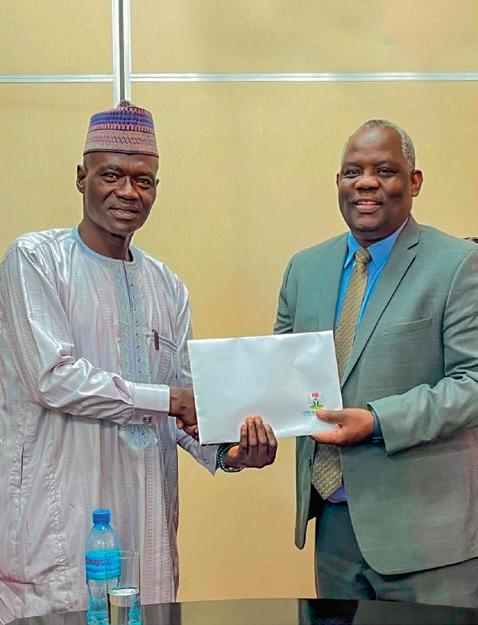
The meeting reflects Air Tanzania’s desire to start flying to West African countries such as Nigeria by 2023 to broaden our reach across the continent.
Visit airtanzania.co.tz to book your trip or call free on 0800 110 045 for more information.
CONTACT
contactcentre@airtanzania.co.tz
Air Tanzania was hugely proud to be voted Most Preferred Airline in Africa at the recent Consumer Choice Awards.
We were up against major carriers on the continent such as Kenya Airways and RwandAir, but emerged clear winners with an incredible 60 per cent of the total votes.
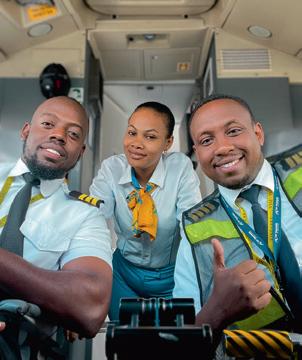
6 / Twiga Air Tanzania news
OFFICIAL: WE ARE THE MOST POPULAR AIRLINE IN AFRICA
IT’S
US
0800 110045 Toll Free (Tanzania only) Tel:
the latest flights, information and to book online, visit:
The awards are voted for by the public so we would like to express our sincere thanks to everyone who chose us as the most popular airline in Africa. You inspire us to get even better. Follow us on: @AirTanzania @airtanzania airtanzania_atcl Air Tanzania ATCL
+255 22 2117500 For
www.airtanzania.co.tz
Why Kigoma is the gateway to Tanzania’s wild west
Our flights to Kigoma open up Western Tanzania to intrepid travellers. Here’s just five options to explore.

Gombe Stream National Park

Famous for its chimpanzee population, this stretch of dense forest around 16km from Kigoma. Along with the chimps, the park is home to blue monkeys, olive baboons, red colobus monkeys, red-tailed monkeys, and vervet monkeys, making for one of the highest concentrations of primates in Africa.
Ujiji
I presume you have heard about the famous moment when Henry Morton Stanley located the missing British missionary David Livingstone. Well,
it took place here at this former Arab slave training settlement. There is now a memorial and museum in the town to commemorate the meeting.
Lake Tanganyika
Kigoma lies on the eastern shore of second-oldest freshwater lake in the world. The lake is dividen among four countries and a great way to visit them is onboard the MV Liemba ferry. Built in 1913 by the Germans, it still stops at several cities on the coast, including Kigoma.
Mahale Mountains National Park
There are more chances for chimpanzee spotting with a wild-living, but habituated group of chimps among the

diverse primate life found among the park’s spectacular, forested slopes on the Lake Tanganyika coast.
Katavi National Park
The flood plains of Katavi offer one of Tanzania’s most off-the-beaten-track safari experiences. It’s most conveniently visited from Kigoma and you’ll be rewarded with plenty of spiky hippo sightings as the cantankerous creatures jostle for space in small pools.
airtanzania.co.tz / 7
Master of Swahili literature sees his work go from PAGE TO SCREEN
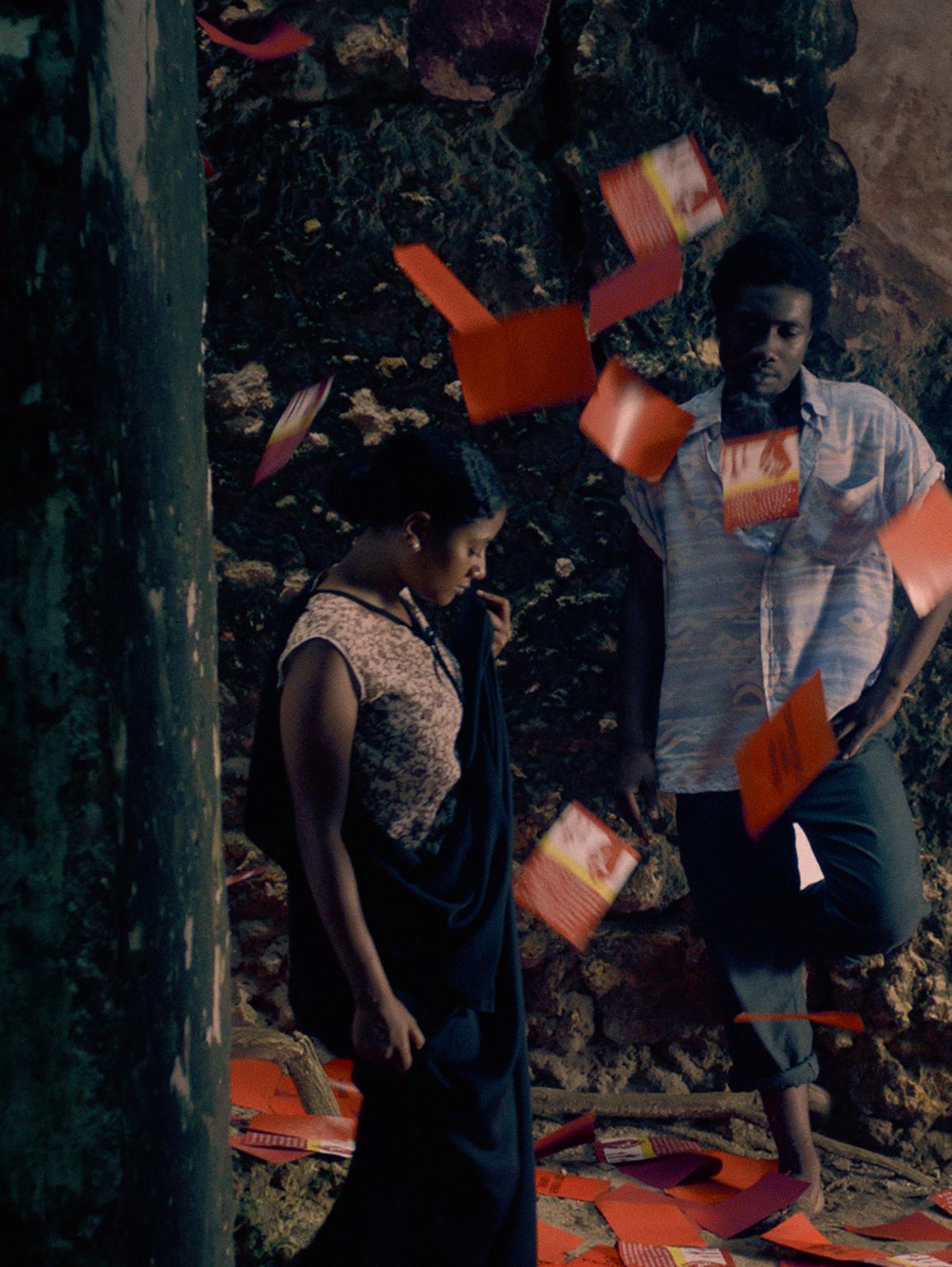
Zanzibar-born Shafi Adam Shafi is one of the most respected and widely read authors in Swahili literature with seven novels published over a writing career spanning five decades. This year his work reached a new audience with his award-winning novel Vuta N’kuvute (Tug of War) made into a film that has been selected as Tanzania’s entry at the 2023 Academy Awards in Hollywood.
In an exclusive interview, the 82-year-old author talks to Mark Edwards about how his work, whether on the page or on the screen, focuses on reconnecting Tanzanians with forgotten, yet pivotal moments in the country’s history.

8 / Twiga
Shafi Adam Shafi
Vuta N’kuvute (Tug of War) is on its way to becoming one of the most important feature films in the history of Tanzanian cinema. Early this year at its mainland premiere at Dar es Salaam’s Century Cinema multiplex the gripping tale of romance across racial divides and amid the fight for liberation that led to the Zanzibar Revolution in 1964 was met with a standing ovation from its audience.
Leading the applause that evening was Shafi Adam Shafi, the 82-yearold author of the award-winning novel on which the film is based. Shafi’s support for what is the first film adaptation of his work in a near 50-year writing career began at the Zanzibar International Film Festival (ZIFF) in 2017 when Tanzanian filmmaker Amil Shivji, whose directorial debut T-Junction had opened the festival and went on to win three awards, first approached him with the idea.
The pair hit it off. Shafi recounts the meeting of minds in a phone call from his home in Dar es Salaam, where he relocated from Zanzibar in 1974 to further his career in journalism and stayed to become a leading light and champion of Swahili literature in Tanzania’s biggest city.

Telling 'the true story'
“We discussed the project, and I could tell that Amil appreciated my work,” he says. “The purpose of the film is to make Tanzanians aware of the role played by people in the struggle for independence. It was that same motivation to educate that drove me to write the novel. Most of the books we had in Zanzibar at that time didn’t tell the true story. I wanted to educate and talk about real life and the struggle for freedom that went on.”
Shivji confirms this connection when I get in touch with him via email. Despite the 50-year age gap between him and Shafi, the work of each shares a common thread in its desire to tackle misrepresentation of African history. He says: “I felt a sense
of solidarity when I read his work. I knew a bit of Zanzibari history, but it has been distorted over the years to benefit political causes. What I saw in Shafi’s work was an honest representation of grievances and celebrations of the people, a marginalised people. This is something that I have always worked towards to in all my films. It was very humbling to find that we share that goal.”
Shafi’s honest, even-handed depiction of the uprisings that foreshocked the Zanzibar Revolution is surprising in that as a student at that time he was a fervent supporter of the ‘Free Zanzibar’ revolutionaries. Then when independence was secured, he became a journalist working for the new government’s newspaper. Yet in the novel’s central illicit love affair between Denge, a Mswahili revolutionary leader trained in the Soviet Union, and Yasmin, whose Indian heritage places her in the privileged upper classes of society, Vuta N’kuvute focuses on the human stories amid the social
complexities on the islands that run deeper than the overt conflict between British colonialists and Zanzibaris.
He says: “Most of my books are pro-revolution in Zanzibar, but there were plenty of people at that time who were against it, and I wanted to show respect to both groups. I made sure I gave both sides a voice in my writing.
“The ethnic divide in Zanzibar at that time was severely hostile. It was not a healthy situation. My storyline brings those people together as one.”
The resulting work of fact-inspired fiction is a window into Zanzibari life at a pivotal time in the archipelago’s history. Shivji was a schoolboy when the book was first published in 1999 and says reading it was an immersive, multi-sensory experience that stayed with him.
“I first read Vuta N’Kuvute as student in secondary school as part of Kiswahili literature and then reread it as an adult practicing film,” he says. “In both cases the novel had me completely immersed in Zanzibari culture pre-independence. I could hear the music, smell the spices, feel the fabrics of that time through Shafi’s writing. And to learn of the active political struggle against British colonialism which was led by the youth of the time made me even more intrigued to study the era and represent it onscreen. I knew almost immediately it deserved to become a film.”

A new audience
Shivji’s big screen version shot on location in Zanzibar echoes such evocations and the cast includes singer Siti Amina – known as ‘the golden voice of taarab’, the traditional music of Zanzibar –with her plaintive songs all over the soundtrack. Like Shivji, many schoolchildren grew up reading Vuta N’Kuvute. Now a new generation is coming to know it through the film. It recently had a two-week cinema run in Dar es Salaam, a rare feat for a Tanzanian-made film in a city
airtanzania.co.tz / 9
/ Shafi Adam Shafi
Vuta N'Kuvute was first published as a novel in 1999
The author being interviewed at ZIFF
served by just three multiplexes with screening timetables dominated by US and Indian blockbusters. It has also become the official Tanzanian entry for consideration for Best International Picture at the 2023 Academy Awards – regarded by many as the most prestigious, significant awards in the global film industry.

Film festival acclaim
The film has also garnered widespread critical acclaim on the international festival circuit. It was the big winner at ZIFF, taking home the Golden Dhow grand prize for Best Feature Film as well as Best East African Feature Film and Best Actor, which went to Gudrun Columbus, who plays Denge. In October it scooped Best Film at showcase for Arab and African cinema the Carthage Film Festival and was also awarded the Special Jury Prize at the Seattle International Film Festival in the US.
Shafi is delighted that his work is reaching a new audience. “There is no doubt that the film has popularised my novel,” he says. This second wave of recognition has come late in the author’s career. He has had seven novels published with his 1978 debut Kasri ya Mwinyi Fuad signalling the start of his lifelong literary pre-occupation with capturing the tumultuous years leading up to Zanzibar’s independence.
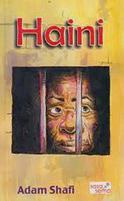
Author's early years
That thirst for knowledge and desire to educate others was in Shafi from an early age. He was the first born in a family of 10 children and soon became a voracious reader with authors who gave a voice to the ordinary and the restless, such as Russia’s Maxim Gorky, chiming with the young Zanzibari’s growing awareness of the nascent revolution taking shape around him. Once he had completed his teacher training course at college in Zanzibar City he set out on an ambitious and arduous journey north across Africa with the intention of reaching the
UK to further his education there. “I wanted to seek knowledge from anywhere,” Shafi tells me. He ended up hitchhiking from Mombasa to Cairo, which not only opened his mind to chance connections and glimpses into new lives, but also meant he was dependent on the kindness of strangers. The journey was often challenging, but the fact that he found many people that gave him lifts, food and a room for the night no matter the country he was in, filled Shafi with a belief in the innate goodness of mankind.
“I learned how to struggle for a living, and I saw the good in people,” he says. Shafi would document his journey to Europe in his 2007 autobiographical work Mbali na Nyumbani, but the kindness he experienced on his travels would resurface throughout his written works, which would become renowned for their open-hearted quality.
Getting published
The UK remained out of reach, but Shafi made it as far as the then East Germany where, in 1961, he earned a scholarship to study economics at the Trade Union School in East Berlin. Once his studies were over, he returned to Zanzibar to write for the new republic’s Swahili-language government-endorsed newsletter.
He tried his hand at writing fiction when the Ministry of Education launched a competition intended to support young Swahili writers. When his work started getting published his journalistic focus on real people and events was still in evidence. His second novel Kuli (‘Coolie’) centres on the strike by port workers in Zanzibar in 1948, which is seen as the first flash point of the brewing dissent that would lead to Tanzanian independence, while 2003’s Haini tackles the contentious issue of political imprisonment and is set in the aftermath of the assassination of Zanzibar’s first President, Abeid Karume.
As well as the use of real-life events, Shafi’s novels are connected by their language. All are written
in Swahili, the lingua franca of East Africa which evolved from the contacts of Arabian traders with the inhabitants of the east coast of Africa – not least the focal marketplace of Zanzibar – to be spoken by more than 50 million people today.
Writing in Swahili for Shafi is a conscious choice. Certainly, he has other options. The erudite author converses confidently in English for close to an hour with me over the phone and he also speaks fluent German as a result of his college years there. He laments that his Arabic is “out of practice”, but it is
10 / Twiga
/ Shafi Adam Shafi
Shafi's novel Haini tackled political imprisonment
Shafi’s use of the language is impeccable. He is unafraid to approach uncomfortable subjects and capture them in succinct and startling prose
still good enough for the practising Muslim to read the Qur’an each day.
However, he tells me writing in Swahili brings something extra to his work. “My target audience are Swahili speakers and so are the characters I write about in my novels, which are set in Swahili-speaking territories. It is appropriate I write for them, and I find I can express myself in Swahili better than any other language.”
Shafi’s use of the language is impeccable. He is unafraid to approach uncomfortable subjects and capture them in succinct and startling prose. Beyond his novels, he has sought to promote the language by co-compiling two Swahili dictionaries to, he says, “enhance the vocabulary of the Swahili-speaking people”.
Along the way, Shafi has encouraged both Swahili readers and writers. He has chaired the Book
Development Council of Tanzania (Bamvita) that works to develop a Swahili reading culture here and has also headed the Authors’ Association of Tanzania. In the near half a century he has lived in Dar es Salaam, he has become a prominent figure in what he calls the “vibrant writing culture” of Tanzania’s commercial capital. There is now a new generation of Swahili writers that have grown up with Shafi’s novels and have found that their literary inspiration is just as keen to champion their work.

Inspiring new generation
Among them is Hussein Tuwa. Shafi has become a mentor to the 51-yearold Swahili author whose debut thriller, Mkimbizi (‘The Fugitive’), sold more than 10,000 copies and who has gone on to publish 10 novels and set up the Dar-based writers’ co-operative, Uwaridi.
Connecting via email, Tuwa
tells me about how his literary idol became one of his biggest supporters. “To me, Mr Shafi was always an inspirational figure. I first met him in 2004 when my manuscript Mfadhili (‘Sponsor’) was selected for the McMillan Aidan Award for Kiswahili literature. He was supposed to advise me on the manuscript and setting of the story and on some final touches to it.
“I was a newbie at that time and knew him only by name and reputation so meeting him face to face was a bit scary. But he made me so at ease that working with him was easy and enjoyable. He has always been supportive of literary and writing efforts made by young and seasoned writers in Tanzania. He was very supportive of Uwaridi and attended the launch event of the association. He was also the guest of honour at the launch of my ninth book, Mtafiti (‘Researcher’), and spoke very highly of not only mine, but also of all the young and upcoming writers’ efforts in Tanzania’s literary arena.”
Shafi is far more than a cheerleader these days. He still writes every day. The grandfather’s last published work was a story for children about “the benefits of the coconut tree” and he is also fine-tuning two unfinished manuscripts for novels, which he hopes will be published soon.
With these new works on the way and the looming Oscars buzz for Vuta N’Kuvute, the legacy of this national treasure of Swahili literature has much left to be written.

airtanzania.co.tz / 11
/ Shafi Adam Shafi
A scene from the film version of Vutu N' Kuvute Vutu N' Kuvutehas won a series of awards already, inclufing for the performances of its two lead actors Ikhlas Gafur Vora and Gudrun Columbus
Welcome the wet season
Tanzania is into its vuli wet season which usually continues until midJanuary with the masika rains to come from mid-March to May. While it is regarded as the low season in terms of tourism, visitors during this time are treated to the country at its lushest and most picturesque.


The dry savannah of the northern national parks gives way to a verdant landscape with animals such as wildebeest in calving season; our many waterfalls are at their most spectacular; it is the best time for bird watching with a wide variety of indigenous and migratory species to spot and the ‘Serengeti of Flowers’, the Kitulo Plateau in the Southern Highlands, bursts into floral majesty with more than 45 varieties of terrestrial orchids carpeting the landscape.
If you love your adventure sports you should know that December to February provides the best conditions for kite surfing on Zanzibar with the northerly Kaskazi winds, blowing between 10 to 20 knots consistently.
All this and you escape the crowds and get to experience these treasures in intimate exclusivity. That’s surely worth getting caught in a downpour or two.
12 / Twiga Photo special




airtanzania.co.tz / 13
Venera Salman / Shutterstock.com

INDIA is our biggest partner in Africa
Tanzania and India have had strong trading links going back centuries with many Indians setting up businesses and choosing to live here. That close relationship has been assisted in recent times by Air Tanzania’s three weekly flights between Dar es Salaam and Mumbai. Here the High Commissioner of India to Tanzania Binaya Srikanta Pradhan talks to Ingrid Kim about forging even stronger ties and how he likes life in Dar.
Can you tell us about the historical bond between India and Tanzania?

The Indian diaspora to mainland Tanzania and Zanzibar began around 200 years ago. You can even find cultural evidence of an early Indian presence on Mafia Island. Now you have a new wave of Indians who have made independent trade connections here in the past few years. We now have 30,000 Indians who hold a
Tanzanian passport. There has been an Indian embassy in Tanzania since November 1961 when the country became independent. The first consulate in Zanzibar was opened in 1994.
From India’s perspective, we value this relationship and we have spent a lot of time to put in place strong political connections. From the beginning all Indian Prime Ministers have visited here and all Tanzanian

presidents have gone to India. These frequent political visits give the relationship a strong foundation. India has always been the biggest destination for Tanzanian exports.
Our bilateral trade is about US$ 4.5 billion, which is around 20 to 25 per cent of Tanzanian total trade. Indian people now play a critical role in the hospitality, finance and engineering sectors. Since 1990, Tanzania has started growing economically and
airtanzania.co.tz / 15 India
High Commissioner of India to Tanzania Binaya
Srikanta Pradhan
tourism
that has led to very multifaceted relations – we have economic engagements, cultural cooperation, trade and investment and ICT co-operation. We consider Tanzania our biggest partner in all of Africa. Tanzania one of strongest partner we have.
Q: Tanzania is famous for its tourism. Is it a popular destination for holidaying Indians?
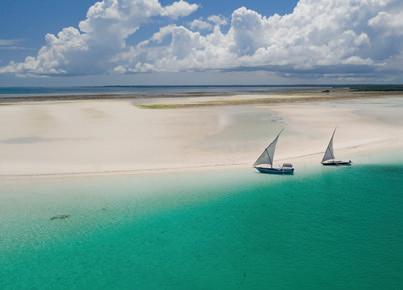

Tanzanian tourism hotspots such as Serengeti Kilimanjaro, Ngorongoro and Zanzibar are well known in India. I hear that the number of Indians climbing Kilimanjaro has increased dramatically. At the start it was mostly Europeans, then the locals started to see Tanzanians also climbing, now they are finding a lot of Indians coming. Our Bollywood film industry is world famous and recently we have had Indian film
crews shooting in the Serengeti. Indian spiritual leaders also come to Tanzania and Zanzibar.
It's difficult for me to tell you exact numbers, but I do see a positive trend in terms of people visiting.
Tanzania: The Royal Tour [TV show that featured President Samia Suluhu Hassan as guide to her country) helped in many ways as it is available to view on the internet. It has proved an excellent promotion for the country.

Q: Can you tell us about the current climate for major Indian-backed investment projects in Tanzania?
I find the new government is very welcoming to the private sector so there is positive atmosphere regarding investment.
There are major investments in pharmaceutical equipment and health care. India’s biggest private
sector health care operator Apollo has signed an agreement to set up a cancer hospital in Dar es Salaam.
I know of another project that involves a US$ 20 million investment in an animal vaccine plant, which I think will be biggest animal plant in East Africa.
Q: What about educational projects?
This is a strong area of co-operation between the two countries. We offer about 700 scholarships per year. We also find that a lot of Tanzanian students go under scholarships from the Tanzanian government finance their own education in India with courses in business, engineering
16 / Twiga
/ India
Excellent promotion: President Samia Suluhu Hassan
Tanzanian
hotspots such as Serengeti Kilimanjaro, Ngorongoro and Zanzibar are well known in India
and medicine because the quality of teaching is so good.
The Indian private sector not only takes Tanzanians to train in India but also builds capacity here. We have set up Nelson Mandela Institutes in science and computers in Dar es Salaam and Arusha. They are doing really well. There is also the Indianowned Saint Joseph University in Dar, which is renowned for its engineering, ICT, science education, medical and paramedical-related studies.
The Indian and Tanzanian governments are planning on building on this success with plans to for the world-renowned Chennai Institute of Engineering to open a campus here. As you know the two countries have very young populations and we want to focus on the future.
Q: Zanzibar seems to be attracting a lot of investment.
Yes, the islands of Unguja and Pemba have a large Indian community. We currently have a US$ 94 million water project going on in Stone Town which should be completed by next year and will have a huge impact. We are also setting up a vocational school in Pemba. I was there recently with the Minister of Education. I am finding there are a lot of Indian investors keen to get involved in the archipelago’s blue economy.
Q: Is there much cultural exchange between the two countries?
Last year we organised around 90 cultural events with Indian and Tanzanian artists, dancers and musicians involved. In Zanzibar also we have the popular Kovali programme, which attracted Indian scholars and archaeologists.
The Indian actor Sanjay Dutt recently became the brand ambassador of Zanzibar, and Tanzanian tourism and legendary cricket star Sunil Gavaskar recently came to Unguja to open a cricket stadium.
The national sport of Bangladesh, Kabadi, has become popular over here with a recent youth tournament being organised in Zanzibar.
Q: How are you enjoying life in Tanzania?

The weather and vegetation in India and Tanzania are similar. Both are green countries. On top of that the people are very friendly. I have found Tanzanians very welcoming. People embrace you here as one of their own, they don’t treat you as foreigner.
If you stop to buy some food from a road-side seller you will always be greeted by a genuine smile and positive attitude. It is a very unique East African quality, and it spreads a sense of comfort and ease. My colleagues and family feel the same way. They feel quite at home here. My mother, who is 84 years old, stays with me and she tells me here feels close to home. That feeling is important. People here are genuinely hospitable from the heart. For me, Tanzania is one of the most welcoming countries I know.
To find out more about Ingrid Kim’s work in attracting investment in Tanzania and Zanzibar, visit dhow-consulting.com or @ingridaworld on Instagram


airtanzania.co.tz / 17
/ India
Ingrid Kim
Dar es Salaam 's city skyline

WIN A NIGHT FOR TWO AT LA COELACANTHE IN COMOROS
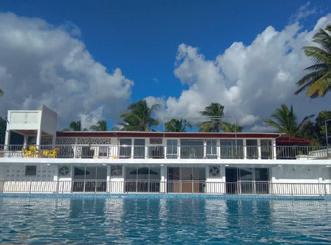
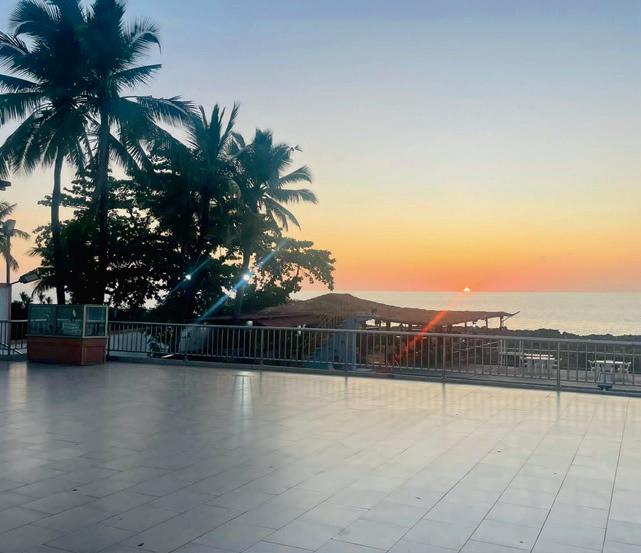
ANSWER THESE QUESTIONS
To be in with a chance of winning, email your answers to the three questions below along with a photograph of yourself holding Twiga 16 on your Air Tanzania flight to competition@landmarine.org by 10th March 2023. Bahati njema!

1 What is the Swahili name of the novel by Shafi Adam Shafi that has recently been made into an award-winning film?
2 What was the name of the professional cycling team Sule Kangangi rode for?
3 What is the nickname of the old town of Fontainhas in Goa, India, that recalls its centuries of European colonial control?
COMPETITION TERMS AND CONDITIONS: Prizes dependent on availability One entry per person. Entrants must be 18 years or over. The decision of the organisers will be final. The competition is not open to employees and their relatives of Air Tanzania or Land & Marine Publications Ltd and La Coelacanthe. The prize does not include accomodation at the destination. Images are for representation only.
Air Tanzania flies into the capital of Grande Comore (Ngazidia), Moroni, where you’ll be greeted by the archipelago’s dramatic landscape in the 2,361 metre-high shape of active volcano Mount Karthala that looms over the town and be able to experience the rich culture of the historic port that was a hub for Arab, African and European traders in the 15th Century. Moroni is also home to beachside resort hotel La Coelacanthe. With stylish, comfortable rooms, a restaurant renowned for its Comorian delicacies and a near Olympic-sized pool, the hotel provides a welcoming base for any trip to Comoros. It has also become part of Moroni’s vibrant music scene with regular events attracting top African DJs and the capital’s coolest crowd. Twiga is delighted then that La Coelacanthe is providing the prize for this issue’s competition.
Last issue’s WINNER
Congratulations to Caroline A. Kazooba who wins a dinner for two at Msonge Organic Farm. Well done and thanks for flying Air Tanzania.
airtanzania.co.tz / 19 competition
WIN
Sleep hacks
SLEEP HACKS
Twiga’s top sleep hacks
Being your best self is so much easier after a good night’s sleep. Your energy rockets, your mind is sharp and you feel like you can take on the world. However, an increasing number of us are falling way short of the medically advised eight hours’ sleep each night. Here’s some tips to make catching some ZZZs as easy as ABC.
Snooze, you lose
We’ve all been there: after a night of tossing and turning and getting nowhere near sleep, you finally drift off only to be bolted awake by your alarm seemingly moments later. The temptation is to hit the snooze button – or smash your phone/alarm to pieces if it’s been a particularly rough night – but any extra sleep grabbed in this way is not going to be deep and will likely result in you finally getting out of bed groggier than ever. Setting the alarm for a slightly later time and not getting caught in the snooze cycle is the way forward.

Nap like a Navy Seal
Napping can be a tricky one to get right. Doze too long and you’re likely to feel even sleepier when you get up, too short and you may struggle to switch off at all. However, retired US Navy Seal-turned lifestyle guru Jocko Willink thinks he’s found the sweet sleep spot. He advocates setting your stopwatch for eight minutes and napping with your feet above your heart (rest them on a chair or sofa). The restorative effect leaves Willink, feeling, he claims, like “superman”. Keeping your legs elevated is scientifically proven to help blood flow which speeds up sleep so he may be on to something. Give it a try.
Go dark
Darkness is an essential precursor to sleep, sending a critical signal to the body that it is time to rest. Light exposure at night, whether that’s a cheeky check of your Instagram page before bed or the glow of your alarm clock, can alter the body's internal mechanism that regulates sleep-wake cycles and play havoc with your sleep. If you can’t cover up all the light sources in your room, consider using a comfy eye-mask.
Power down
Cut the caffeine by the afternoon
As bright lights
are one of our biggest triggers to our brains that it has to be wake and alert, it is important to start sending the opposite signals a good hour before bedtime. Turn off smartphones, laptops and TVs and swap your bright electronic lights for candles. The red flame stimulates melatonin – a hormone in your body that stimulates the sleep cycle – so get your night-time reading in by candlelight and you’ll soon fall asleep.
A morning cup of coffee is a great way to jolt the body awake and give your mind some much-needed acuity for its daily tasks. However, that caffeine can take around 10 hours to leave your body so if you are still drinking coffee into the afternoon, it is likely to affect your ability to go to sleep. If you are in need of an afternoon pick-me-up, opt for green tea, which has a lower caffeine content.
Keep your cool
Tanzania’s tropical weather is great when you’ve got a day at the beach organised, but it is not ideal for a restful night’s sleep. Experts say the optimum room temperature for sleep is 18.3C. If you don’t have an air conditioner or fan to create that, then try having a cool bath or shower before lights out and once in bed, sleep with just a sheet over you.
20 / Twiga
Exercise regularly
We know sleep is good for us and you can’t get much more sedentary than lying flat on your bed for eight hours so a similarly relaxed day-time schedule of desk-sitting and TV watching should be just as restorative, right? Wrong. Studies have shown that prolonged sedentary behaviour is linked with an elevated risk of insomnia and sleep disturbance. So, everyone should be aiming for some amount of exercise every day. It doesn’t take much: a daily walk or a spot of gardening can make a difference in your rest. However, if you are exercising intensely, it is wise not to do it too close to your bedtime as it can leave you revved up and struggling to relax. Best end your gym sessions at least two hours before you go to sleep.
Limit the noise
For sensitive sleepers, noise can be a major obstacle to sleep, whether it is loud neighbours or a snoring partner. A good pair of earplugs that are comfortable and will stay in throughout the night should help. Having a room that is too quiet can also cause problems with the silence seeming to amplify the slightest bump in the night. In this instance, it may be wise to mask any potential noise with a soothing ambient musical soundtrack.

Stick to work-week sleep schedule even at weekends
Weekends of late nights and lie-ins may sound like delicious indulgence, but they can seriously mess with your sleep patterns. When our internal body clock is out of whack with our social times it can create an effect known as social jet lag with similar symptoms to cross-timezone travel. It all means that when Sunday night comes, we struggle to sleep and Monday mornings are an unpleasant shock to the system.
Breathe deep
To sleep well, you need to be calm and one of the best ways to activate your parasympathetic nervous system – a network of nerves that relaxes your body and helps run life-sustaining processes such as digestion – is through the breath. Breathing deeply with a longer exhale mimics how your body feels when it’s already relaxed, so after inhaling and exhaling for a few rounds, you just might find yourself feeling calmer.
Get out of bed
This one might sound ridiculous at first, but if you just can’t fall asleep continuing to just lie there stressing about how you are going to cope with the coming day is not going to help. Best instead to get out of bed and out of your bedroom and take your mind off your sleep issues. Once there do something soothing, such as reading or listening to quiet music with the lights down low. You can then return to bed when you start feeling tired again.
Soak up some sunlight
Another one that might not seem to make much sense initially is getting some natural light early in the morning. However, while those dawn rays will make us more alert, they will also help you reset your biological clock and ease into sleep a little earlier. Aim for around 30 to 45 minutes exposure without sunglasses or a visor (though don’t look directly into the sun, especially if it’s high in the sky).
airtanzania.co.tz / 21
/ Sleep hacks
Why the south coast is Tanzania’s scuba secret
Its wealth of coral reefs and sea life make the coastline of Tanzania and its surrounding islands a premier diving destination. Most head for the Zanzibar archipelago, which is just fine with Laurent Bedouret and Martha Taylor because it means they have the pristine reefs of Mikindani Bay in southern Tanzania to themselves and their lucky guests at their Eco2 Diving centre. Here the environmentally minded pair explain how the centre both showcases and supports this hidden gem of marine life.

QCan you tell me about your respective experience as divers? Where are some of the best places you have dived before coming to Mtwara?
A. Martha – I left my hometown when I was 18 to travel the world. Along my trips, I grew fond of the ocean and its ecosystems. I decided to become a professional diver and, through my job, had the chance to dive in many places: Australia, South-East Asia, Africa, and Central America. All places were great respect to their features: coral reefs, underwater walls, wrecks, endangered and rare species such as sharks, turtles, rays and more. Laurent – Unlike Martha, I am
quite new in the scuba diving world. I was working in the aircraft industry as a mechanical engineer, before becoming a professional scuba diver for the past eight years. I had the chance to dive in Europe and Central America (Pacific and Caribbean) but have to admit that my best dives are in Mikindani.

Q. I believe you both fell in love with Mikindani on arrival. What makes the place so special?
A. Mikindani is a great combination of land and underwater beauties. On land, Mikindani is a typical Swahili village with a long history of trading, perfect to enjoy an authentic Tanzanian experience. It is a quiet
place away from the chaos of (Air Tanzania flight destination and the capital of the region) Mtwara.
Underwater, the magic starts. The coral reefs are amazing, the sea life is abundant and diverse, and the landscapes are incredible. You could call it a divers’ paradise.
Q. There has been a lot written about how much of the world’s coral reefs have been damaged by warming waters, microplastics and over-fishing. What has kept the reefs near you so pristine?

A. The coral reefs in Mtwara are still pristine due to the limited development and relatively small levels of pollution here. Also, the fishing here is quite respectful of the environment: the traditional methods reduce the destruction of the underwater habitats, and there are guidelines on where and when to go fishing to ensure that marine ecosystems have enough time to regenerate.
Unfortunately, we are already
22 / Twiga eco2 diving
The orange skunk anemone fish is a regular suight in the Mikindani Bay reef
seeing a degradation on the local reefs due to the quick development of the area bringing more pollution and increasing pressure on the local ecosystems (mangrove deforestation, littering, coastal development, etc).
We need, as a community, to start protecting the area right now to avoid being left with nothing in the future.
Q. Your website (eco2diving.com) reveals the coral in Mikindani Bay includes ancient species never previously discovered. Can you tell us more about that?
A. Coming from Indonesia, the southern equatorial current crosses the whole Indian Ocean and hits the East African Coast in the Mtwara region. This current is bringing cool water full of nutrients. The underwater reliefs along the coasts allow this rich water to come very close to shore, creating amazing, easily accessible coral reefs.
With over 258 corals and 400
species of fish recorded so far, this area is recognised as the centre of biological diversity for the whole East African coast. Mtwara area is the start of two conveyor belts, one heading north to Kenya, one heading south through the Madagascar channel, that spread the rich diversity and nutrients all along the East African Coast.
Q. How does the Eco2 Diving school ensure it is protecting the marine environment?
A. Eco2 Diving is doing its best to keep the area as magical as possible. During our diving excursions, we are following the recommendations of organisations like Project Aware and Green Fins that are providing guidelines on responsible diving, no touching or anchoring policy.
We also carry out regular underwater and beach clean-ups to keep all the garbage away from the ocean and protect the reefs from human pollution.
We run a coral reef restoration
project to educate people about marine conservation and participate in the regeneration of the local reefs to survive the increase in pollution and human pressure.
Recently, we have started a sea turtle conservation project based in Msangamkuu to stop the decline of the local population and protect them. Sea turtles are key for the marine ecosystems and their loss would have a huge impact on all the marine food chain.

Finally, we always teach and explain to our guests about small changes that can have a big impact: stop eating fish, stop littering, stop using single-use plastics, etc.
Q. Can you tell us about the range of marine life in this stretch of the coast?

A. Our dive sites have an abundant number of fish species and gives you the feeling of swimming in an aquarium.


On one hand, pelagic fish such as barracuda schools, trevallies and

airtanzania.co.tz / 23
All images courtesy eco2diving.com / eco2 diving
A Mola-mola sunfish blue back
Mikindani Bay is renowned for its abundant and diverse marine life
tuna are often spotted and even tag along for the duration of a dive.
On the other hand, our muck dives (scouring the sea floor for marine life) reveal treasures such as harlequin pipefish, mantis shrimp, ribbon eels, seahorses, frogfish, robust ghost pipefish and a large variety of nudibranchs and flatworms.
fish like potato groupers, napoleon wrasse, tunas or trevallies would come to say ‘hi’.
Miniliths
A. Well, it is a very difficult to choose as the diving is really good here. But I would go for one of our night dives when we saw baby octopus hanging around, playing together and hunting. After 10 minutes admiring them, we headed off… to see a cuttlefish hunting a cornet fish, right in front of us, before escaping. Finally, we reached the shallow waters and a baby squid showed up and started to play with our underwater light. The complete darkness surrounding us accentuated the light going through its translucent body. An amazing hat-trick of cephalopods!
Another standout was on one of our regular dives on the local reef. We were already amazed by the abundance of fish flying on top of the pristine corals. But as we were heading to the surface, we met a pod of 20 dolphins! They hung around us for a good 10 minutes, swimming in circles and playing with each other. It was a magical moment.
Tell us about some of your favourite Mikindani diving sites.
Monoliths
Monoliths is one of our best dive sites. The landscape is made of several monoliths, or big rocks covered in pristine corals, that are creating channels. When diving these channels, you feel like Superman flying in between buildings in Manhattan. The monoliths can be as tall as 30 metres, and as wide as 40 metres. But not only the landscape is impressive, the fish are abundant, and schools of surgeon fish, fusiliers and batfish surround you giving you the feeling of swimming in an aquarium. On a regular basis, bigger
Miniliths are the little sister of monoliths. The smaller size of the monoliths is compensated by a larger number of fish surrounding you: schooling surgeon fish and unicorn fish, fusiliers, red-tooth triggerfish, with barracudas or trevallies dancing in the blue and checking you out. All of this and a pristine coral cover.
Cryptomania
Cryptomania is one of the best muck dives in the world. Starting on a sandy area, you might spot a robust ghost pipefish, or a flying gurnard. Keep going and you will be face to face with seahorses, cuttlefish and many kinds of nudibranchs and flatworms. Once reaching the reef, you are now likely to see harlequin pipefish, mantis shrimps, ribbon eels, leaf fish and frogfish, on top of the usual scorpion fish, lionfish, boxer shrimps, and the typical reef fish in abundance. Let’s say that an hour’s dive is never enough here!
Red Buoy
Red Buoy is the most impressive of our dive sites.

This dive starts in an area devastated by dynamite fishing, a way to remind our guests that we still need to protect what we love. After heading out of this no-coral’s land, the slope becomes steeper and steeper until facing proper walls, starting 15 metres under the surface down to 60-plus metres. Each wall is offering cracks and crevasses to explore in this incredible eerie atmosphere all while being surrounded by schools of fish.
A. No one is left behind at Eco2 Diving.
For people that are not scuba divers, we organise sunset trips to enjoy the ocean while staying dry on the boat, or snorkelling excursions on the shallow reefs of the area to see the

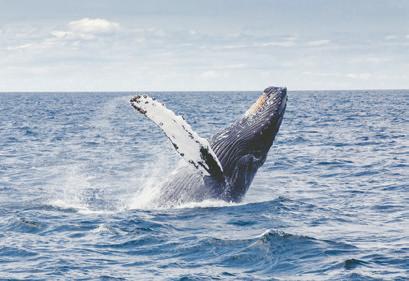

beauties of the underwater world.
For people who are willing to try scuba diving, we suggest diving in with the Discover Scuba Diving (DSD) programme. Over half a day, guests are first taken to a pool and then to the ocean to experience scuba diving in a completely safe environment.
Finally, for certified divers, we have enough dive sites with different depths and level requirements to fit everyone.
All our excursions are led and supervised by properly trained and certified staff.
Q. Can novice divers get their PADI dive certificate at your school so they can head off on some of the dives?
A. Eco2 Diving is a diving school that has the capacity to teach scuba diving up to professional level.
We offer all the courses for people willing to climb the PADI ladder, from Scuba Diver level to Divemaster, as well as many specialities like deep diver, night diver, search and recovery, drift diver, peak performance buoyancy and more.
On top of the classic scuba
24 / Twiga
Q. Is there something for all levels of divers here?
Q. What has been your diving highlight since coming here?
/ eco2 diving
Eco2 Diving has courses for all levels of divers
Majestic seasonal visitors to this stretch of the Indian Ocean include humpback whales
courses, we also offer courses dedicated to marine conservation: coral restoration courses, sea turtle conservation courses, shark aware, dive against debris, etc.
Q. Are there particular times of year you recommend coming here for diving?
A. Even though there are always better periods than others, our diving is great all year.
Conditions might be bad due to the weather for a couple weeks but not on a regular basis.
Except for specific species like the humpback whales that are coming from August to November, and the sunfish from July to September, the rest of the fish species are around all the time.
Q. As well as the dive school, your eco lodge and restaurant is run with a similarly sustainable ethos. Can you tell us more about the measures you have introduced to keep your presence here as light on the environment as possible?
A. As environmentalists, we are doing our best to reduce our impact.
In our lodge, we removed every single-use plastic and rearranged our rooms to avoid the need for air conditioning.
In our restaurant, we only use ingredients available locally and hopefully soon enough, that we have grown ourselves. We reduced the range of seafood we are serving while extending our range of vegetarian dishes.
In our bar, we reduced or removed most of the drinks in plastic bottles to use glass bottles instead. We also offer free drinkable water to our guests to reduce the need of plastic water bottles.
More generally, we have created a full waste-management system to collect, repair and reuse as much as we can before recycling when it is feasible.
Q. How do Ten Degrees South and Eco2 Diving ensure the involvement of locals in the growing tourism industry?
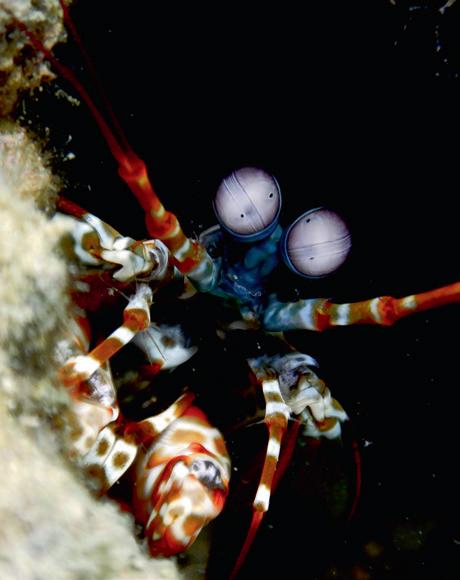

A. At Ten Degrees South and Eco2 Diving, we really work on hiring people who come from Mikindani or Mtwara to ensure the development
With over 258 corals and 400 species of fish recorded, this area is recognised as the centre of biological diversity across East Africa
of the local area. We are more focused on energy and motivation than diplomas and qualifications. Everyone has a chance if they are willing to learn.
On top of a continuous training in their field, we try to create interest and help them develop other skills: some of our staff are trained to become self-entrepreneurs, some are taught about permaculture and waste management, and one of our captains is now a certified diver and strong defendant of the environment. Currently, we are preparing one of our housekeepers to be part of our team of chefs.
For more details on the diving centre and resort and a full list of the PADI training and excursions available, visit eco2diving.com
airtanzania.co.tz / 25
/ eco2 diving
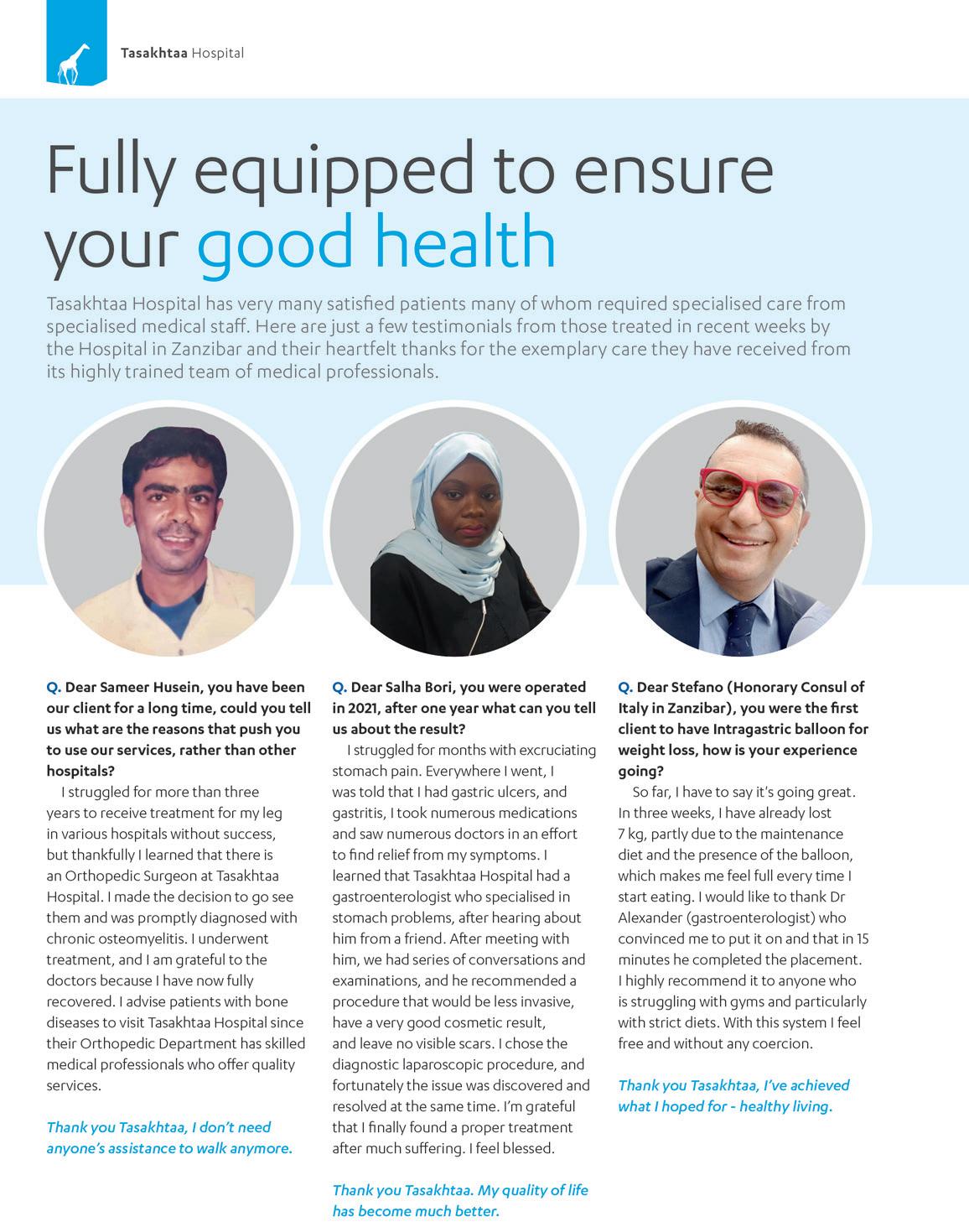
26 / Twiga

airtanzania.co.tz / 27
A bake to showcase our seafood riches
With around 1,500 km of Indian Ocean coastline and a wealth of enormous lakes, Tanzania is a pescatarian’s paradise. Twiga cookery columnist Belinda Mkony puts those seafood riches to good use in this issue’s protein-packed recipe.


Fishing is a pivotal part of the Tanzanian culture, boosting our economy and providing the population with tasty sources of high-quality protein. So, I thought in this issue I’d pick a dish that showcases our seafood riches in delicious fashion.
Now that the holidays are around the corner, I’m gathering all of my favourite seafood to make this Cajun bake. To me, there is nothing quite like burying my bare hands into a classic Cajun seafood bake and lathering every piece in garlic butter.
This is seafood bake is accompanied by a delicious ukwaju (tamarind) garlic butter sauce and a dash of hot sauce. Not only does it have a variety of seafood that can be freshly caught in our beautiful Indian ocean, but it's the ultimate complete meal that the entire family will love! It is a perfect outdoor meal to entertain, with a sauce that will have you licking your fingers clean. So give the recipe a try, share it with your loved ones and get your hands dirty. Serve it with some garlic toasted bread for mopping up the yummy buttery juices.
28 / Twiga
Cooking with Belinda Mkony
Ingredients
6 Half a kilogramme of whole baby potatoes
6 2 corn on the cob cut into 3-4 inch pieces

6 3 lobster tails, de-veined and cut in half
6 Half a kilo of clams scrubbed
6 Half a kilo of calamari, cleaned and cut in to rings.
6 Six smoked beef or pork sausage cut into half-inch pieces could be Farmers Choice Choma sausages
6 Two to three free-range eggs
6 Eight to 12 large king prawns peeled and de-veined (leave tails on)
6 One onion peeled finely chopped
6 Two sticks of butter
6 Two tablespoons chopped parsley
6 120 grams Old Bay seasoning plus more for garnish
6 Five cloves of garlic finely chopped
6 One tablespoon of Italian seasoning
6 Two tablespoons of Cajun spice
6 Two tablespoons of Ukwaju/ tamarind juice
6 Two tablespoons of paprika, preferably smoked
6 One tablespoon of cayenne pepper or hotsauce
6 One tablespoon of black pepper
6 One tablespoon of sugar
6 Three lemons divided use
6 Two oven bags
6 Two lemons cut in wedges
6 Salt and pepper to taste.
Method
1. Start by preheating your oven to 200°C/180°C.
2. Sauté the sliced sausages until cooked then remove them from the pan and set aside. In the same pan melt two sticks of butter in a frying pan on medium heat. Once melted add the diced onions and cook for two minutes until they turn translucent, then add in your diced garlic and cook off for another two minutes.
3. In a side bowl combine all your seasonings. Mix them well together and add them to your butter mixture then cook at a low heat for another two to three minutes. To finish off your sauce add a squeeze of one lemon. Taste as you add ingredients and the butter absorbs the flavour. Leave on low heat (stir occasionally) while you prepare the rest of your meal.
4. In a side pot boil salted water and cook the baby potatoes, egg and corn for mins. Then deshell the egg and set aside your vegetables.
5. Drain then evenly distribute to the oven bag.
6. Now add the prawns, calamari, clams, lobster and cooked sausage to the bag. Pour butter sauce into oven bag and give it a good shake.
7. For safety reasons, I would use two bags just in case. Tie a knot in each and place on a baking tray. Secure them tightly so all the juices are absorbed by the seafood and veg.
8. Bake for 20 minutes. No more. You do not ever want overcooked seafood.
9. While the seafood is baking, in a big pan over medium heat, add the remaining butter and stir in the
minced garlic. Sauté the garlic for one minute (it should not brown). Add the seafood, boil seasoning and cayenne pepper plus Ukwaju juice. Balance the sauce with a little bit of sugar to achieve the ultimate sweet and sour sauce. Stir to mix the spicy butter sauce well. Turn off the heat.
10. Once its done, transfer the seafood and vegetable mixture into a big serving dish, sprinkle over with some finely chopped parsley and decorate it with lemon wedges. Serve immediately. Done and dusted! Enjoy!
FOLLOW BELINDA
To keep up with her latest recipes and events, visit Fork.Ur.Munchies on Instagram
airtanzania.co.tz / 29 All images courtesy of
/ Cooking with Belinda Mkony
Belinda Mkony
WHAT SULE STARTED, WE WILL FINISH
When Kenyan professional cyclist Suleiman ‘Sule’ Kangangi was killed in a high-speed crash during a race in the US in August the nascent East African cycling community he had been instrumental in developing was left devastated. While the region still mourns the loss of an inspirational athlete, plans are taking shape to ensure his pioneering work is continued.
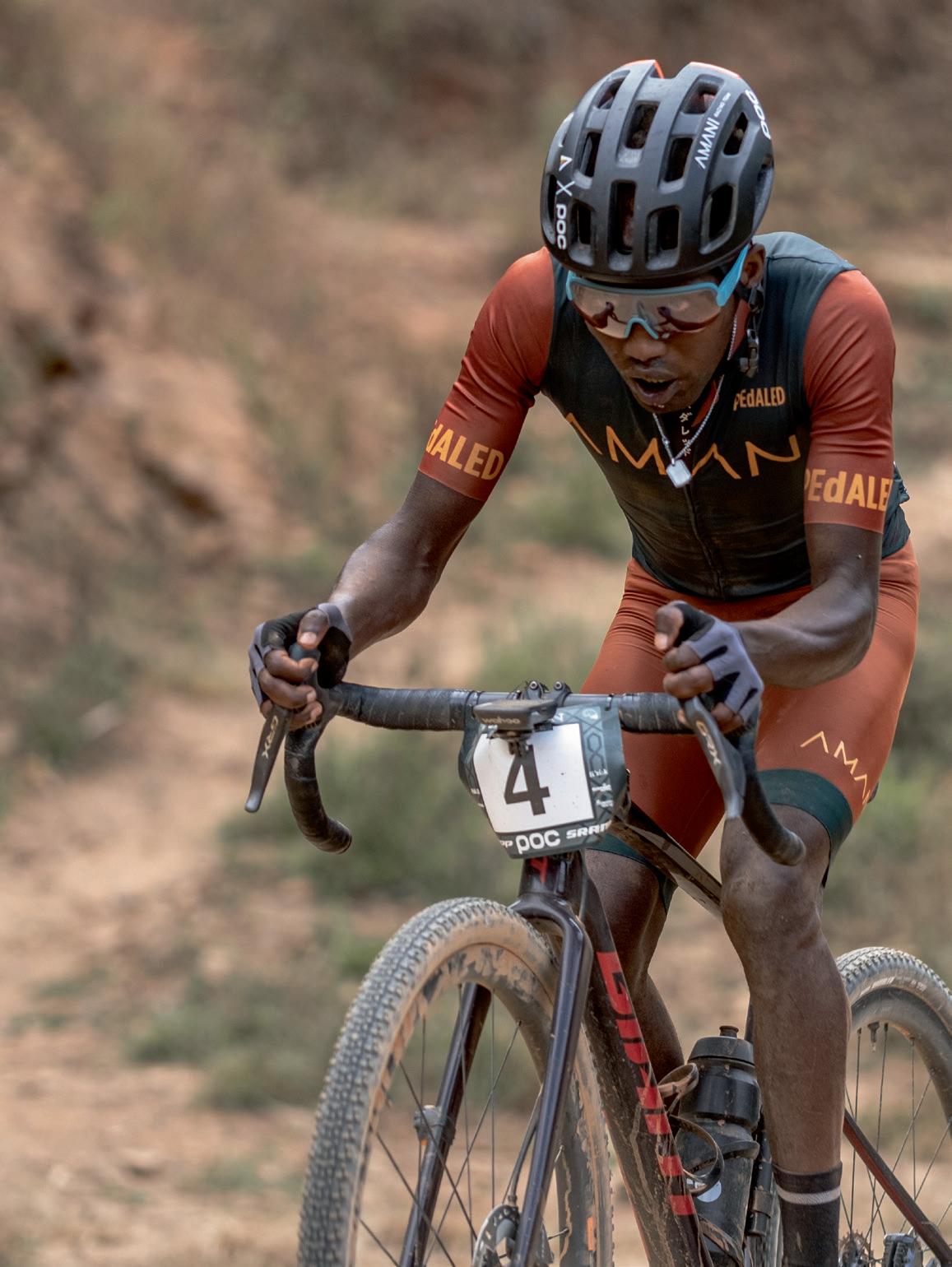
30 / Twiga
Sule Kangangi
The world of professional cycling was left in state of shock on August 27 when Kenyan rider Suleiman ‘Sule’ Kangangi died from injuries sustained in a high-speed crash during the Vermont Overland gravel race in the US. The 33-year-old had become one of the biggest names in East African cycling due to his achievements on and off the bike and the husband and father’s death has been keenly felt by the people he met, inspired and raced against along the way. Among those paying tribute were Rachel Ruto, wife of Kenyan President William Ruto, who posted on Twitter that she had lost a “talented cyclist, a mentor and a friend”. Chris Froome, the Kenyanborn British cyclist and four-time Tour de France winner said Sule’s passing was “heartbreaking”.
Sule was born and grew up in Eldoret, in the heart of the Kenyan Rift Valley. At 2,400 metres above sea level, the town is known as the altitudinous breeding ground of some of the world’s best long-distance runners, but when the riders of a bike race flashed through the town, the then 22-year-old Sule knew he had found the sport for him.
Winning races
He joined a local cycling club and started putting in the miles. By age 28 he was a professional road racer, signed with Kenyan Riders Downunder. He then became one of the few African cyclists riding on the European circuit with Bike Aid, a Germany-based professional team set on priming African cycling and athletes. Sule still raced in Africa and in 2017 he became the first Kenyan to finish on the podium in a race on the international professional cycling calendar when he was placed third in stage race the Tour of Rwanda.
Sule had always harboured a dream of competing in the Tour de France, the pinnacle of the pro cycling season, but now in his early 30s after a late start in the sport

he knew his chances were slim. However, in the global boom in gravel racing the Kenyan – who had trained for years on the dirt trails of the Rift Valley – saw the chance of a second act and a way to further serve his personal desire to grow cycling in East Africa. Already, he was active in growing the sport he loved among the people he loved, organizing charity rides for children and hosting events, clinics, and school events in and around Nairobi.
Last year, he teamed up with American Mikel Delagrange, an international criminal lawyer at the United Nations and a cycling fanatic, to organise the first Migration Gravel Race, a four-day event in Kenya’s Masai Mara. Sule finished second, one of seven Africans to make the top ten in the final standings. Such a strong showing for the continent’s cyclists convinced Sule and Mikel to set up Team Amani, a 12-man professional gravel and mountain biking team based in Eldoret and made up of riders from Kenya, Uganda and Rwanda.
Amani had corporate sponsors from the global cycling industry and was able to attract highly ranked international cyclists to races it organised in Africa, such as June’s Evolution Gravel, a five-day, 800 km slog from Ngorongoro Crater to the Swahili Coast in Tanzania. None of that strong international field could keep up with Sule, with the Kenyan crowned winner of what is billed as Africa’s toughest race.
Gravel racing
Amani was also able to send its riders to off-road races that suited their talents across the globe. Recently, Sule had taken ultra-endurance event the Badlands in Spain’s Sierra Nevada range, the Cape Epic stage

airtanzania.co.tz / 31
/ Sule
Kangangi
None of that strong international field could keep up with Sule, with the Kenyan crowned winner of what is billed as Africa’s toughest race
Sule Kangangi playerd a key role in putting African cycling on the global map and raising the profile of the sport at home
race in South Africa and, most recently, gravel events in the US, where the sport is hugely popular. It was here that Sule met his tragic end.
His death is still raw for the riders and staff at Amani. Sule was the team’s captain and the driving force behind its creation. Here, in an interview with Twiga, Mikel Delagrange, who co-founded Team Amani with Sule, talks about how the team is broken, but not beaten by the loss of Sule and is dedicated to strengthening the spirit of his legacy.
Can you put into words the impact the death of Sule had on Team Amani and the wider cycling world?
From a team perspective, we were all completely devastated. It was a nightmare that we still haven’t woken up from. He left a huge void that cannot be filled. The cycling world obviously responded with shock and dismay as well. Dying on the bike, while always possible, is far from the norm. There was a massive outpouring of grief together with messages and gestures of support coming from all over the world. It was a testament to how much Sule achieved and how many lives he touched in such a short period of time.
Sule was the captain and an inspiration to other riders. Can you sum up how valuable he was to Amani? It is impossible to sum up how important he was to our team. The
entire project was conceived and built around Sule and his vision for cycling in East Africa. He was the living embodiment of what was possible. He inspired everyone around him to be better and to settle for nothing less than greatness. His ambition was enormous and his dream was to show the world what athletes from East Africa are capable of on a bike. He was the hero we needed to inspire the next generation.
Team Amani is made up of cyclists from Kenya, Rwanda and Uganda? Can you tell us how Sule first appeared on the Amani radar? What were the cycling qualities he had that attracted you?


I was a fan of Sule long before I got to know him on a personal level. When we came together to discuss the state of cycling in East Africa, we were both at a crossroads in our lives. He was phasing out of his contract with the German team BikeAid and I was trying to decide whether I should get involved in the cycling scene in East Africa (a region I had worked in for many years as part of my day job as a lawyer). In our first meeting, it was obvious to me that Sule was a unicorn (one of a kind). His ideas and passion were infectious. He had experience, vision and purpose. I simply got in line behind him to help him realize his dreams for Kenya and East Africa.

32 / Twiga
/ Sule Kangangi
He did a huge amount to support the growth of grassroots cycling in his home country. Was this passion always evident to you? Can you give some examples?
His passion for the sport was the first thing that struck me. He was the consummate professional. He lived and breathed cycling. There was a sense of urgency about him. He knew that this was his moment. He knew he had a central role to play in bringing the sport of cycling to his home country and region. He was everywhere. In any given day he could be organizing a training camp for the development team in Kenya while preparing to give a podcast to international cycling journalists then scouting a new route for a gravel or mountain bike race somewhere in Kenya. He didn’t stop.
Team Amani was set up to enhance inclusivity for African riders. Was Sule an important part of this? It was Sule’s vision. He saw first-hand how unequal the access was to the sport of cycling for people from the

Global South. Whether it be a lack of access to top competition, visa restrictions to travel to the Europe or the US or lack of basic equipment in East Africa, there were many barriers to entry that Sule sought to tear down with the Team. Together, we came up with novel solutions to old problems. When the pandemic hit, we brought ‘smart’ trainers into the cycling clubhouses in East Africa to enable the riders to race online against the best in the world. When we noted the lack of racing opportunities, we organized a worldclass bike race in Kenya called the Migration Gravel Race and convinced the best in the world to come to Kenya rather than the other way around. To showcase the best of East Africa, we started Team Amani and hired the best cyclists from Kenya, Uganda and Rwanda to compete in gravel and mountain bike races across the world.
I see the memorial fund to raise money for Sule’s wife and children has raised nearly $100,000. He was obviously well-liked. Can you describe his personality?
For someone so talented, he was incredibly approachable. He had the ability to leave a lasting impression on people after even the briefest encounters. His personality included traits that in other people might seem contradictory - he was modest and ambitious, he was passionate but not dramatic, he was serious, but he didn’t take himself too seriously. I’m not surprised at all about the outpouring of support from the wider cycling community. He touched so many lives.
He had a nice guy image, but was he also fiercely competitive? Yes. Fierce is the right word. He

was the kind of guy who would kick your butt on the bike then offer you a coffee or chai after the race. We refer to him on the team as our lion. He demanded excellence from himself and from everyone around him. No compromises, no excuses. His greatness was undeniable and served as an inspiration for the team and for future generations of cyclists.
Does Amani intend to organise races/events in Sule’s memory?
His memory and example is so pervasive on our team that he almost transcends memorialization. For us, naming a race after Sule is insufficient in terms of honouring his legacy. We wouldn’t exist without him. After he died, we asked Sule’s family (and ourselves) whether we would bury Sule’s dream along with his body. The answer was a resounding NO! Therefore, we decided then and there to ‘press on’. Everything we do from here on out is in honour of Sule. We have huge ambitions that are still unrealized. To start, we are currently building a permanent facility in Iten Kenya. We hope to use the facility to develop the next generation of top-level cyclists. In the coming years we hope to send Kenyans, Ugandans and Rwandans to the biggest races in the world ... and we expect them to win! What he started, we will finish.
FIND OUT MORE
For more information about Team Amani, its riders, upcoming races and how you can contribute to its cause, visit teamamani.com
airtanzania.co.tz / 33
/ Sule Kangangi
He was the consummate professional. He lived and breathed cycling. There was a sense of urgency about him. He knew that this was his moment

INDIA’S ‘LITTLE PORTUGAL’
At just an hour’s flight from Mumbai, Goa attracts plenty of tourists to its spectacular beaches, but it also has a fascinating heritage worth exploring. Murli Menon (left) explores the coastal state’s capital, Panjim, which is home to a colourful Unescoprotected Latin Quarter that provides a window into 19th century Portuguese living.
The Fontainhas Latin Quarter is the central attraction of Goa’s capital city, Panjim. Flanked by the Ourem creek to the east and Altinho hills in the west.
The centre of activity is Unesco World Heritage Site Fontainhas Street, which locals still refer to as ‘Little Portugal in Goa’. The Portuguese ruled Goa for almost half a millennium after first invading the
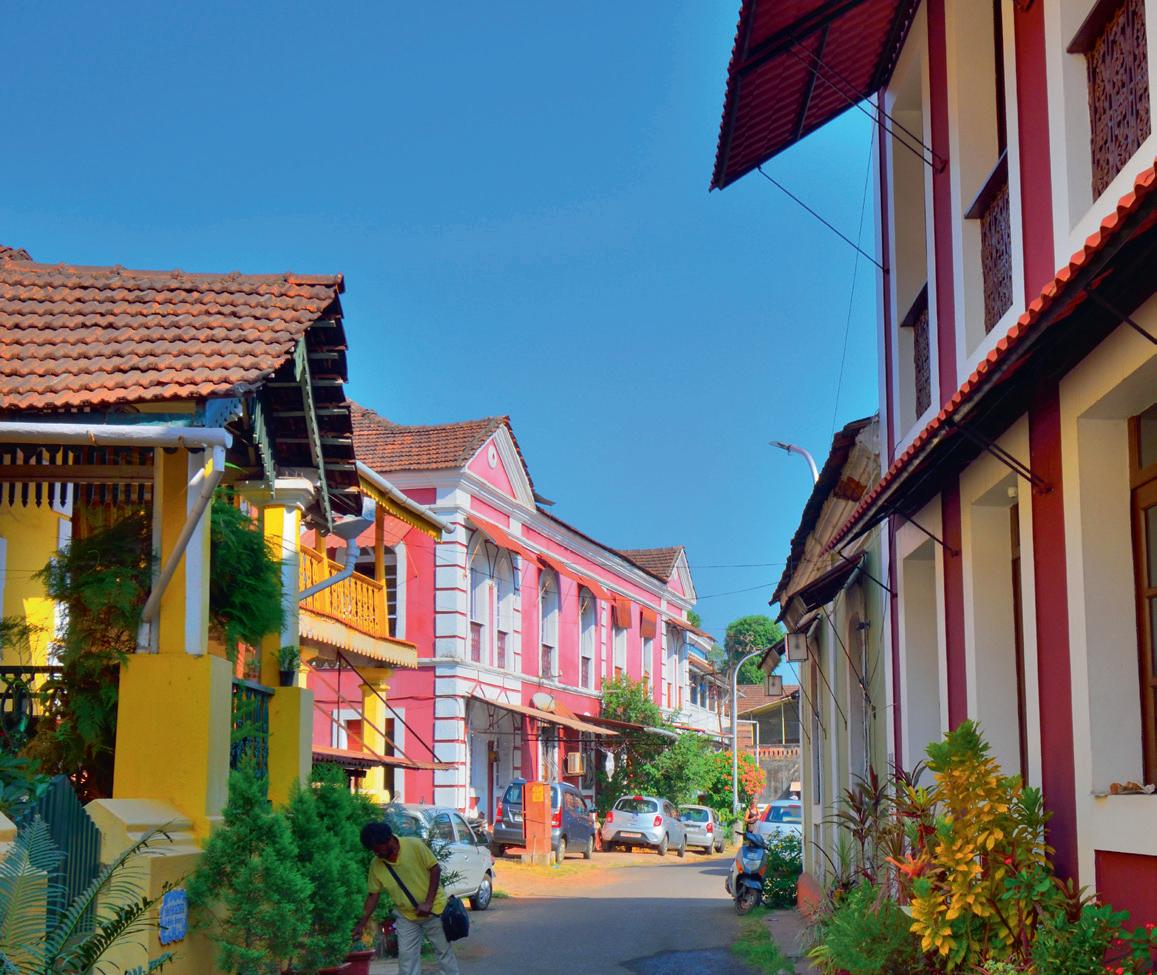
region in 1510. It was only won back by India after a 36-hour battle in 1961.
The Fontainhas neighbourhood was founded by Portuguese aristocrat Antônio João de Sequeira, who set up a series of coconut plantations here. However, in the early 1800s, due to a plague outbreak in Old Goa, the Portuguese government headquarters was shifted to Panjim. As a result, this area was transformed into

the residential area for Portuguese administrative officers and staff.
The Unesco protection was introduced in 1984 with efforts in place to maintain its enchanting centuries-old architecture. The Old Town can only be explored on foot. Walking through the winding lanes here transports you to Portugal of the 1800s. Large European-style houses stand side by side. They are
airtanzania.co.tz / 35 Little Portugal
Saurav022 / Shutterstock.com
coloured from bright yellow through ruby red to cobalt blue seem to jostle with each another for space. The bright paint jobs are given an annual touch-up after the June to September monsoons here, a rule that has been adhered to since the time of the Portuguese occupation.
Colourful streets
Other distinctive design touches include the intricately designed iron railings and red tile roofs. Most homes also have name plates on the wall hand painted ceramic tiles that are decorated with intricate, colourful artwork.
Popular selfie spots for visitors include a red well with two pillars each topped with a ceramic rooster and a rainbow-coloured set of steps. The Portuguese heritage of the region is soaked into the candy-coloured streets. For instance, Rua 31 de Janeira (31st January Road) is named after the day when Portugal got independence from Spain on January 31, 1640; and 18th June Street is named after the day in 1946 that
marked the beginning of the end of Portuguese rule in Goa.
Any visit to Goa will be incomplete without visiting the old-world charm of this Portuguese heritage. It will give you real insight into the origins of the laidback ‘Susegad’ lifestyle the state is renowned for. Derived from the Portuguese word sossegado, it has come to sum up the relaxed attitude towards life that is said to have existed historically in the former Portuguese territory.

February is the best time to visit when the Fountain Festival takes
Other
distinctive design touches include the intricately designed iron railings and red tile roofs
over the old town. Tourists from all over the world visit here during this time to enjoy local Goan culture and art. Locals turn their houses into art galleries and homestays during this festival.
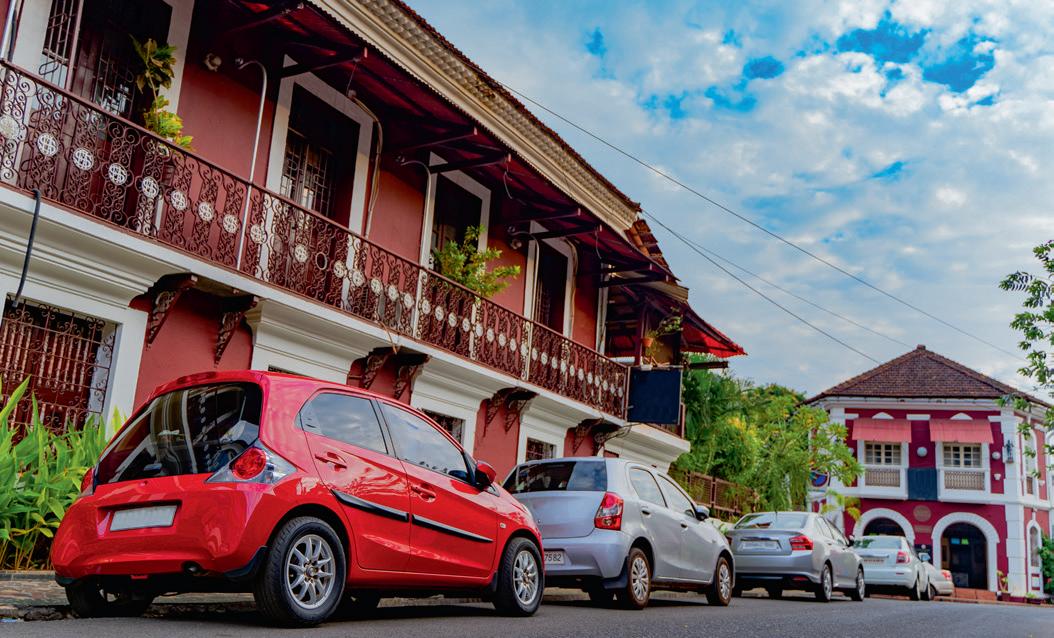
It's also worth walking to the top of Altinho Hill, which will give you breathtaking views over the Latin Quarter and one of its most imposing buildings, the tangerine-hued Maruti Hindu Temple. At the base of the hill, you’ll find the Phoenix Fountain, a beautiful natural spring that dates back to the Portuguese era and which it is thought the town of Fontainhas gets its name from.
Murli Menon is a travel writer based at Ahmedabad in Western India.
For more information, contact ceo@tips4ceos.com
36 / Twiga
/ Little Portugal
A Portuguese-style grand home in Fountainhas Street
World Cup success of ‘Serengeti Girls’ leads way in new era for
WOMEN’S FOOTBALL IN TANZANIA
When the ‘Serengeti Girls’, Tanzania’s U-17s women’s national team, made the last eight of the World Cup, in Mumbai in October, it was the record-breaking high point of a past few years that have seen Tanzanian football announce itself on the world stage across all levels of the game. Secretary General of the Tanzanian Football Federation Wilfred Kidao believes these recent successes are just the beginning. In an exclusive interview with Twiga, the former pro player puts the recent successes down to a roots and branches plan to develop the game here at home.
QWith the U-17s becoming the first Tanzania team to make the quarter finals of a FIFA World Cup and the U-20s and full team having recent success at Cosafa tournaments, it seems Tanzanian women’s football is at an all-time high? What do you think are the main reasons for this success?


All that is happening is based on a long-term technical development plan for women’s football which brings a proper pathway for the girls in football.
The success of such a young team suggests the future is bright for Tanzanian football.

Of course, that is how the plan is all about and we believe this is the beginning of the long-term success which we are working on.
Q. Have you seen the effects of Tanzania’s raised profile in world football? Do you anticipate an increase in international fixtures now?
Our target was always to give ourselves a chance to prove ourselves
at that level and we did that which means the world of football now knows about Tanzania. We surely anticipate getting ourselves more involved as the world knows what to expect from Tanzania.
Q. What are you doing to capitalise on this recent interest in sport? What moves are in place are in place to spread the sport at grass roots level?
We have managed to develop a Women Football Strategy which it is a game changer from that perspective
airtanzania.co.tz / 37
Tanzanian women's football
Wilfred Kidao Secretary General, Tanzanian Football Federation
looking for more involvement and also changing the perception from Tanzanian society as far as women’s football is concern.

Q. I believe you accompanied the team to English Premier League side Southampton FC for training sessions ahead of the World Cup. What was that experience like? The training at Southampton FC was massive for the girls to get ready for the World Cup. It was really nice to have that technical level of coaching with the club taking part to some of sessions. We cannot thank Southampton FC enough for that.
Q. I’m imagining for many of the U-17 players, the World Cup was their first time in Asia. How did the team cope with the new experience? Were there nerves before the matches?
You can always expect players to be nervous when they take part at a major tournament for first time. Our girls were no different. That was one of the reasons why we did not have a good result in our first match [Tanzania were defeated 4-0 by Japan] although we were up against quality opponents.
Q. Were you surprised by the scale of the U-17s success in Mumbai or did you know they were a special team?

When you consider the magnitude of our preparations and the long, difficult process we went through to qualify for the tournament, I was in no doubt that the team were going to make headlines and we were pleased with the step.
Q. What is the route for most girls into football here in Tanzania?
Grassroots is the base of everything we do at TFF. We are encouraging the sport to be played in schools and for the organisation of regular school tournaments, club leagues are another important influence.
Q. You have been CEO and General Secretary at TFF since 2017. What have been your proudest achievements in that time?
Obviously qualifying for the World Cup is massive, but it was also a huge achievement for our senior men’s team to qualify for the Africa Cup of Nations (AFCON) in 2019 and for our U-20s to qualify for AFCON in 2020 for the first time in their history. Our U-17 boys have made it to the last three AFCON tournaments, which is a huge achievement. These all leave me with fantastic memories and proud moments of being in office.
Q. What are some of the goals of the TFF concerning women’s football in Tanzania?
We want our Women U-17, U-20 and Senior Women National Teams to be qualifying consistently for World Cups. I believe we are in the process of realising that ambition.
Q. Is it possible for some of the best women players to earn a living as a footballer in Tanzania at the moment?
Absolutely. In the topflight here [the Serengeti Lite Women's Premier League] all players are paid. It may be not as much as in the men’s game, but it helps to sustain their daily life.
Q. Where are the cities/towns in the country where women’s football is most popular?
You’ll find women’s football being played across almost all regions in Tanzania, but most teams are to be found in Dar es Salaam, Mwanza, Arusha, the Coastal Region, Iringa, Morogoro and Tanga.

38 / Twiga
/ Tanzanian women's football
We want our Women U-17, U-20 and Senior Women National Teams to be qualifying consistently for World Cups. I believe we are in the process of realising that ambition
The Tanzanian U-17 national team celebrate getting to the quarter finals
Q. If a young girl is interested in playing football here what would be your advice on where they can get started?
School football would be an ideal starting point.
Q. What do you think are the advantages of playing football for girls growing up?
Looking from a scientific point of view, footballers benefit from starting to play at a tender age if they want to go to succeed as professional. It is the same in the men’s and women’s game.
Q. Do you believe there is still some prejudice and taboo surrounding girls playing football and other sports in the country? How are you addressing that? That’s why one of the objectives in our Women Football Strategy is changing perceptions. That is the way we intend to confront it.
Q. With that in mind, was it disappointing to you that President Samia Suluhu Hassan has been quoted as saying that women footballers will struggle to find husbands because of their athletic physiques?
I am the kind of person who tries to see positives in everything that happens. I feel our Madam President’s statement was misinterpreted by most people.
Record-breaking route to the World Cup
Here’s how the U17 Women’s Team made the record books in becoming the first Tanzanian team to qualify and then reach the last eight of the World Cup.

WORLD CUP QUALIFIER
Tanzania 5 vs Cameroon 1 (on aggregate)






Over two legs, the Serengeti were clear winners and secured their ticket to Mumbai.
WORLD CUP GROUP STAGE
Tanzania 0 vs Japan 4
The team suffers its heaviest ever loss in a tough opening match against highly ranked Japan.

Tanzania 2 vs France 1

The Serengeti Girls bounce back in style with goals from Diana Mnally and Christer Bahera.
Tanzania 1 vs Canada 1

Qualification for the quarter finals is secured in this hardfought draw with Veronica Mapunda’s goal enough to get them through.
QUARTER FINAL
Tanzania 0 vs Colombia 3
The dream is over, but Tanzania go down fighting to the eventual losing finalists Colombia.

airtanzania.co.tz / 39
/ Tanzanian women's football
SAFARI IN STYLE
Trends meet travel when Tanzanian couture showcase Safari Fashion Weekend arrives in Arusha in February. Here, founder of the event Lily Massa gives us a sense of the style tips on offer with leading lights of the Tanzanian fashion world giving some staple safari looks a creative makeover.
There was a time when pith helmets and jodhpurs in shades of beige, crisp white blousons and lace-up, brown-leather brogue boots were the epitome of romantic safari fashion. It was incredibly chic and yet intimidating. Very Karen Blixen.
In the past couple of decades this formal look has been given a modern makeover with animal prints, cargo pants and stylish footwear giving a streetwear edge to safari style.
In the post Covid-era, I have found that safari fashion has become more eclectic and more wildly stylish than ever. Millennials and zoomers are embracing minimal safari looks that blend seamlessly with the amazing ecosystems we are so lucky to have here in Tanzania such as the savannah of Nyerere National Park or the alpine terrain on the slopes of Mount Kilimanjaro National Park
Safari Fashion Weekends were created to bring together domestic tourists and designers for a weekend of game drives entwined with private mini fashion shows at exclusive lodges in and around national parks in Tanzania.

As a taster of this year’s event to be held at Chele Chele Villa, in Arusha, here’s a modern safari look created by Tanzanian brand JVS. The long, hooded jacket, black strappy top, khaki shorts and knee-high boots create a futuristic style ideal whether you are lounging around the lodge or on a balloon safari at the break of dawn.

40 / Twiga Safari Fashion Weekend
About the author
Lily Massa is the owner of Dar es Salaam-based Massa Consultants as well as a life-long fashion enthusiast. As her company’s CSR (corporate responsibility project) she has set up a series of fashion shows that showcase the work of homegrown designers. The second Safari Fashion Weekend offers designers and guests an exclusive staycation at Chele Chele Villa with game drives in the adjacent Arusha National Park and then a pop-up fashion shop giving the opportunity to buy the latest Tanzanian fashions.
MORE INFORMATION
Safari Fashion Weekend II will be held at Chele Chele Villa, Usa River, Arusha on Saturday, February 11 2023 at 2pm. For more information, email safariweekends@gmail.com
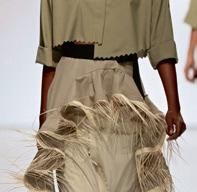




airtanzania.co.tz / 41 / Safari Fashion Weekend
(Below) Safari collections by three Tanzanian designers, Doreen Mashika, JVS and Farouque Abdela, in a show at Swahili Fashion Week 2017 showcased by Lily Massa


HEAVEN SCENT TRAVEL
Sometimes when choosing a new place to visit, it pays to follow your nose. From farms of flowers that give the world’s best perfumes their scent to freshly picked spices drying in the sun, the Air Tanzania network is full of sensory delights to experience.

Take a deep breath in when you arrive in the Comoros and you’ll know why they call it the Perfume Isles. Grande Comore, Anjouan and Moheli – the three islands that make up the Union of the Comoros – are each festooned with farms of ylangylang trees with oil derived from their extremely fragrant yellow blossoms used as a key ingredient in some of the world’s most sought-after perfumes, including the iconic Chanel No 5. A mature ylang ylang tree blooms almost constantly so the signature deep, rich aroma with hints of custard, jasmine,
Comoros Ylang ylang

banana, honey and spice perfumes each day on the islands. Tours of the farms can be arranged and with the blooms being harvested around three times a month – the trees are always being pruned to keep all blossoms growing within reach of the pickers –there’s a decent chance you’ll get to see the on-site distillation process in which the essential oils are extracted. Along with Madagascar, Comoros dominates the world’s supply of ylang ylang. It has become an important source of income for many locals and crucial to the country’s overall economy, yet it
has also taken its toll on the islands’ lush, tropical environment. Much of the archipelago’s forest cover has been cut down to make way for more farms and even more trees are felled to provide firewood to the stoves that fuel the distillation process, which can take up to 18 hours. To counter these effects, tree-planting programmes have been introduced to protect the biodiversity of the soil here and distillers are being equipped with economical stoves that require less wood to fuel. The hope is such measures will secure a sweet-smelling future for Comoros.
Kagera region
airtanzania.co.tz / 43
Cloves Zanzibar
Time spent in Zanzibar is a treat for all the senses, but as smell is most closely linked to our formation of memories, it is the scent of the archipelago that is destined to stay with us. Whether it’s the aroma of sizzling street food in Forodhani Park as dusk draws in; the bittersweet scent of freshly roasting coffee at Jaws Corner in Stone Town or the briny tang of the fish market, Zanzibar is a super smeller’s dream. Perhaps the islands’ most fragrant feature, though, is its spice farms.
The archipelago earned its nickname of the Spice Islands in the 1800s after Omani settlers introduced the clove tree to the region. Plenty more spices followed – among them nutmeg, cinnamon, cardamom, turmeric, vanilla and ginger root – but cloves remained the main cash crop for exporters. The spice is integral ingredient in Swahili cuisine where, once dried, it is used ground or whole in cooking, especially as a key ingredient in chai masala.



Most recipes use cloves sparingly; their spicy, warm, and faintly sweet flavour is
Coffee Mbeya
With warm summers and fresh winters, plenty of rainfall and volcanic soul that is rich in minerals, Tanzania’s Southern Highlands has the perfect conditions for coffee cultivation. Its rolling hills are carpeted in evergreen coffee fields and many of the farms here organise tours for visitors. Sensitive sniffers that come during the wet season will notice that the plants have small white flowers that give off a heady, jasmine-like scent. The scent of the flowers reaches a peak that last for three or four days and spreads a rich aroma across the farm. The beautiful smell is a sign for farmers that the flowers will
very powerful even in small doses. Aside from their culinary uses, they are also commonly used as painkillers in dental emergencies.
If you are lucky enough to visit the islands of Unguja or Pemba during the months of September, October and November you’ll
see the buds of the clove tree on mats by the roadside drying in the sun. The cloves are left out for about three days. As they dry, they release a sweet, heady aroma, which wafts throughout the islands.
soon fall to the ground leaving nubs that will grow into cherries, which will contain the prized coffee beans when harvest time arrives from May to July. This, of course, is just the beginning of the fragrant coffee journey. Once the arabica or robusta beans – both varieties are farmed around here – are roasted they produce an oil called caffeol that is responsible for that evocative coffee smell. When you grind the bean even more of these trapped aromatics are released so you get a blast of amazing aromas from all the tiny pieces of coffee you have created. On top of that, it tastes pretty good too.
44 / Twiga Kagera region
Chai Mumbai Experimental Perfume Club
London
We thought we’d include the upcoming Air Tanzania destination of London in the list, because the UK capital offers the chance for visitors to create a personalised perfume and wear your very own unique scent. At the Experimental Perfume Club lab in London’s West End you can learn from experienced perfumiers and create your own scent blended from the award-winning collection of niche fragrances. As the famous Coco Chanel quote goes, “Wear it wherever you want to be kissed.”
experimentalperfumeclub.com

Jacaranda Zambia

The Zambian capital Lusaka never looks more beautiful or smells sweeter than in September and October when the Jacaranda trees that line its main streets are in bloom forming a purple canopy. The silvery branches and the trumpet-like flowers lift the look of the city and give off fragrant clouds of scent redolent of honey with a musky undertone.
A good smell is an important part of a positive hotel experience and that is why you’ll find the smartest of hotels spend a huge proportion of their branding budget on creating signature fragrances that envelop you throughout the building. The Four Seasons Hotel Guangzhou has taken that a step further by partnering with renowned Shanghai scent maker OSMOSE to create a Fragrance Journey Room Package. Guests will be able to sample and choose the fragrance of their

You are never too far from a cup of chai in Mumbai. The city has literally thousands of tea stalls with chai-wallas serving Mumbaikers with a relaxing, aromatic brew, which smells as good as it tastes. Chai means ‘tea’ in Hindi and it comes as a mix of tea (usually Assam), whole milk and a host of fresh spices. There are a number of chai varieties to choose from, but for a multi-sensory treat go for a kulhad chai. It is served in a traditional kulhad or terracotta mug that enhances the earthy aroma of the drink. The mug has no handles, so you cup your hands around it for a comforting experience.
choice upon check-in and the hotel will prepare a fragrance dispenser in their room. Among the fragrances created for guests are Moody Woody with ginger and pepper intended to give your night a spicy whiff of sexiness; The Bedtime Story with a fruity citrus scent to help you unwind and Sleeping Pill, which has a twist of yuzu and citrus for a blissful night’s sleep. Such olfactory treats are combined with the hotel rooms’ eye-popping panoramic views of the city skyline.

airtanzania.co.tz / 45 / Kagera region
Four Seasons Hotel Guangzhou
GuoZhongHua / Shutterstock.com
How Tanzania’s 12-year-old tourism ambassador is making world leaders listen on climate change

Tanzanian schoolgirl Sharon Ringo is just 12 years old yet she meets with heads of state as a tourism ambassador, has set up her own foundation with the aim of planting two million new trees in Tanzania, is a published author with two new books due for release and she could well be the secret weapon to empower the youth of Africa to make a stand on climate change. Twiga meets her.
Like many of the invited guests at November’s global environmental summit Cop 27, Tanzanian Sharon Mowo Ringo, the Trade and Tourism Ambassador of the East African Community (EAC), was dressed for action in a power suit and primed to put her case for collective action to combat climate change with an understanding and passion that has driven a lifelong dedication to the cause.
What set Sharon apart was her age. She has just turned 12 years old. Still, the grade 7 pupil at Braeburn International School in Mbezi Beach, Dar es Salaam, arrived at the event

with a renown that got her audiences with heads of state such as Tanzanian President Samia Suluhu Hassan and Hakainde Hichilema, the President of Zambia, as well as President of the African Development Bank Dr Akinwumi Adesina, former US Vice President Al Gore and Pakistan’s Minister of State Romina Khurshid Alam.
Now back at the family home in Dar neighbourhood Mikocheni, Sharon shares her surprise and joy with me that her heroes at the event seemed just as appreciative of what she had achieved. She says: “When I met President Hassan, she told
me: ‘Thank you Ms Ambassador for supporting me. Great work.”
That Sharon’s reputation preceded her even in such high-powered surroundings is testament to all she has done to protect the vulnerable planet she was born into just over a decade ago. Since she can remember, Sharon has loved the beauty of her homeland. Which she describes to me as “a modern Eden”. Her parents took Sharon and her two younger brothers to places such as Serengeti, Zanzibar, Mount Kilimanjaro, the Ngorongoro Conservation Area and Saadani National Park, trips that left Sharon
46 / Twiga
Sharon on a street clean-up
Sharon Ringo Foundation
with an appreciation of the country’s wealth of natural treasures as well as their fragility. From the age of eight she started planting trees in her neighbourhood to do her bit to counter the deforestation she saw as a key contributor to the raised temperatures and extremes of weather that threaten these natural environments and the local communities that depend on them.
Young role model

Sharon’s proud father shared her efforts through engaging social media posts and last year word reached the Tanzanian government and its President. The appointment of the country’s first ever woman leader meant a lot to an ambitious schoolgirl such as Sharon. “It marks how far we have come as a country in empowering girls and women to participate in big decision making. She has proven to the world and especially Africa that women can do great things as well.”
The admiration was mutual with President Hassan taken by Sharon’s tree-planting efforts and her championing of Tanzania’s natural

attractions. They chimed with her mission to revive the tourism sector in her country in the wake of the Covid pandemic. Sharon became the youngest ever person to be appointed a Trade and Tourism Ambassador for the East African Community and was later to also become Tourism Ambassador for Africa under African Tourism Board and Tourism Ambassador for Tanzania under the Ministry of Natural Resources and Tourism.
The tree-planting schoolgirl was taken aback by her new platform of influence. “I was not very much aware of being activist, I just planted trees to protect our mother earth,” she says.

Two million trees
In light of her ambassadorial appointments, Sharon’s parents decided to, as she puts it, “formalize and structure my activities”. The result was the formation of the Sharon Ringo Foundation (SRF), which aims to engage more school-age children within and beyond Tanzania’s borders in climate activism, environmental justice and sustainable tourism. It also allowed a serious ramping up of Sharon’s tree-planting scheme.
“I have a project of planting two million trees annually under my foundation,” Sharon says. “So far, I planted over 39,750 trees. We plant these trees in public and private institutions such as schools, churches and hospitals. My team is working on identifying areas in need of rehabilitation to make the biggest impacts and restore nature.
“The demand for trees is very high given the severe environmental degradation happening within the country. It is our great desire to have more support to push this project and reach out to many places. We
have seen how successful it is for the trees planted so far. I was talking to my dad and doing some numbers and we calculated that if 1,000 young, strong people planted 100 trees per day, we would have an additional two million trees planted in 20 days.”
Funding for the ramped-up tree-planting scheme has come in part from a percentage of the sales of Sharon’s debut book, ‘The Big Five’, in which the nature-lover shares her passion for the heavy hitters of Tanzania’s world-leading wildlife – lions, leopards, elephants, African buffalo and rhinos. Sharon is very proud to say she wrote the book “word for word” and is sure it will soon turn its readers into tourists in Tanzania.
“If you read my book, your desire to visit Africa will shoot up because Africa is a paradise which in this case has to be protected at all cost,” she says. “I got very good support from professionals working in Serengeti, Ngorongoro Conservation and other national parks and game reserves. Through my book people will get an incredible opportunity to learn, visualize and imagine the magnificent experience of the Big Five.”
Global spread of Foundation
Along with the success of the book, the foundation has expanded its operations beyond Tanzania’s borders with 14 affiliated school clubs each with its own appointed ambassador in countries such as the US, China, South Africa, Nigeria, Cameroon and across East Africa. “They are supporting me and the foundation to execute various projects through their influences, talents and gifts,” Sharon says. “Society is waking up to what we are doing. So many people visited the foundation’s [Dar es Salaam] office to ask for trees and support our tree planting in their areas after listening to my speeches or visiting my social media platforms.”
This widening of the foundation’s operations has recently been
airtanzania.co.tz / 47
/ Sharon Ringo Foundation
I have a project of planting two million trees annually under my foundation. So far, I have planted over 39,750 trees.
Sharon meets her inspiration, Tanzanian President Samia Suluhu Hassan
Sharon Ringo, on a beach clean-up on in Dar es Salaam.
(Top right) planting trees for her Foundation
boosted by winning an Africa Green Grant Award from Eleven Eleven Twelve Foundation.
It's a startling level of achievement for someone not yet in her teens, but for Sharon there is no time to waste. “We are not safe as long as climate change is not reversed,” she says. “During my travels with my family I could see how the environment was damaged by people cutting down trees and poor waste management. When you watch Television and social media you can see scary things, droughts and floods are killing our people, nature and animals all around. I visited the Manyara area [in northern Tanzania] in July last year where I saw children starving, with no food or water. I also saw animals dying in the drought. It was very scary. I wish the world could know this and I stretch the hand of hope to my fellow children.
“I feel so obligated take care of the nature and environment, Knowing that there is no tourism without nature and no nature without trees. Planting trees, protecting and preserving them is my calling and I always tell the people, both the children and the adults, to come together and work together to reverse the impacts on climate change. It is a call that we must do it now, do it in smart ways at speed and scale. We are in an emergency state.”
Campaigning for change
So, while she enjoyed her time in the Egyptian coastal city of Sharm el-Sheikh where Cop 27 was held –with adventures including seeing the pyramids and camel riding – when it came to the summit, she made sure she got her message across.
“I was happy to travel to Egypt, however, my biggest concern is whether countries, especially EAC countries, will follow up with the climate goals that were set. My foundation is organizing a campaign to follow up with leaders concerning the implementation of those goals.”
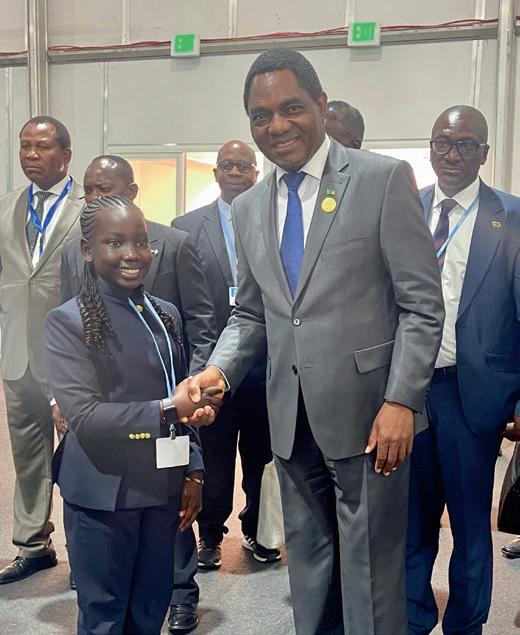
Sharon believes she was listened to. She has not been afraid in the past
to lay the blame for climate change on the “greed” of world leaders, but she remains optimistic that change will come.
“I believe that world leaders will change and take necessary actions. The impact is severe and it affects everyone. I have seen so many leaders changing and supporting my movement. I have had several invitations from leaders to speak and inspire others.”
A confident schoolgirl
Beyond Greta Thumberg – whose book, ‘We Are All Great”, was an early inspiration for Sharon – there can’t be many others whose lives have been so transformed by their climate activism at such a young age. Despite the demands of her foundation and her ambassadorial duties, Sharon says she still has plenty of time for normal childhood activities. She loves to paint Tanzanian wildlife scenes – with recipients of her work including the US Ambassador in Tanzania – and enjoys basketball, football, tennis, swimming, diving and, of course, travelling. She credits her parents for keeping her grounded.
“Everything seemed very surreal at first, but then the activities as an ambassador made everything so thrilling when I saw how I influenced many children and adults. I am privileged to have parents and a team that trains me to have balanced life in everything I do.
“I have a very well-planned schedule; my school timetable remains undisturbed; I meet with the foundation team twice or once per week and more during holidays. When I visit the office, all activities are already planned to maximize my productivity. If I have a new idea for
our programs, I can simply call the office’s phone. Honestly, I get plenty of time to engage in playtime and my hobbies, I cannot complain.”
She also thanks her father for instilling her a self-confidence that has allowed her to hold her own in audiences with world leaders.
“Attending Cop 27 was a great experience, I was among the youngest attendees at the meeting,” she says.

“All these great leaders spared their valuable time to listen to me and my ideas. They wanted to know about my work and my book. They all marvelled at my presence there due to my age, ideas and confidence. I was truly humbled.”
That self-assurance is to be explored in her next book release.
Entitled ‘The Confidence I Learned from my Father’, Sharon says it “will inspire people to attain higher heights, confidence unlocks many opportunities to people. I wish that many children will read this book.” Another book that will give “a simple and clear explanation
48 / Twiga
/ Sharon Ringo Foundation
All these great leaders spared their valuable time to listen to me and my ideas. They wanted to know about my work and my book
Sharon with her father who helped her setup the Foundation
Meeting Hakainde Hichilema, the President of Zambia
of climate change” and hopefully educate and motivate readers into making their own stand is also due to be published soon.
“Information is power, without it we leave room for a lot of disasters and lack of action,” Sharon adds. “If we are aware of what is happening around us, we can take the necessary action. If people learn of the disastrous impacts of climate change, they are more likely to take necessary actions.”
Travelling is learning
With this mission to educate and so invest young Tanzanians in their country, the SRF has organised a series of guided tours of the country’s hot spots that revisit many of the sights that so fascinated Sharon on family trips.

“I want my fellow children to have unforgettable experiences to tell the world about,” she says. “Currently I am organizing the Sharon Ringo Zanzibar Tour set for around April next year. I can’t wait for others to
have the same experience I had when cruising the Indian Ocean and seeing dolphins playing.”
Soon those tours will be far further afield as the foundation continues its international expansion and becomes something no climate summit can ignore.
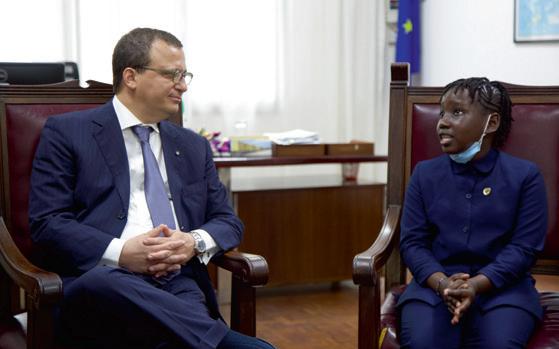
“It is my desire to work with many children around the world, our voice is bringing changes. So, I call upon parents and guardians from different parts of the world to connect their children with me to work together and bring the change on climate.”
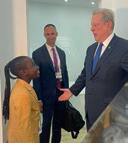


MORE INFORMATION
To keep up Sharon’s latest moves and the work of the SRF, visit her YouTube and Instagram pages.
If you would like your school to be part of the SRF’s ambassador programme, call +255 652 202 202.

For information on the coming Sharon Ringo Foundation tours, visit the website at sharonringofoundation.org
Sharon’s
Tanzanian experiences
Sharon is well-travelled in her homeland and these are some of the most memorable places she has visited.
Air Tanzania is delighted that when Tourism Ambassador Sharon and her family explore Tanzania they do so with Air Tanzania. She says:
top
1. MOUNT KILIMANJARO 2. ARUSHA 3. SERENGETI 4. ZANZIBAR
An airline fit for an ambassador
airtanzania.co.tz / 49
“I love travelling with Air Tanzania, first of all it is our own aviation company, but also, they have new aircrafts with professional pilots and cabin crews. The food and drinks in the planes are delicious and yummy!”
/ Sharon Ringo Foundation
East Africa's youngest tourism ambassador at work. (Top right) Sharon with Italian Ambassador in Tanzania Marco Lombardi
Upendo Kisiwani
Love on the island
BY LILIAN MBAGA
The latest in Twiga’s exclusive series of Swahili short stories from members of Dar-based writer’s collective Uwaridi is a morality tale about never forgetting the importance of love.
Hapo zamani za kale, Upendo, Bahati, Matumaini, Furaha, Mafanikio na Huzuni walienda “kula bata” kwenye kisiwa kimoja cha maraha. Lakini ghafla, tangazo la tahadhari likanadiwa kwamba, mafuriko makubwa yalikuwa yanakaribia kukikumba kisiwa hicho—hivyo kila mmoja alitakiwa kuondoka haraka iwezekanavyo.
Wahka na hofu kubwa vikawajaa. Ikazuka ghasia kila mmoja akiikimbilia mashua yake. Hakuna aliyekumbuka kubeba vitu vyake vya thamani. Kila kitu kilitelekezwa ufukweni.
Katikati ya taharuki hiyo, ni Upendo pekee ndiye hakukimbilia chombo chochote cha usafiri. Kwanza, alikwenda kukusanya vitu vya thamani vilivyotelekezwa ufukweni na kuwapelekea wenyewe kwenye mashua zao. Pili, akaanza kuhakiki endapo kila mmoja amekwishapanda kwenye mashua. Baada ya hapo ndipo alipogundua kuwa, ni yeye pekee ndiye hajapata chombo cha usafiri—na hakuona chombo chochote kilichosalia.
Ndipo akamwona Matumaini akiondoka na mashua yake. Akamsemesha: "Matumaini, naomba unichukue tafadhali. Nimekosa usafiri."
Matumaini, akamjibu kwa kumpa matumaini tu, "Ooh, Upendo, ondoa shaka. Huko nyuma kuna mashua nyingi zinakuja. Utachagua na kupanda upendayo."
Upendo alirudi kuangalia chombo cha usafiri kwa ajili yake—kama alivyoshauriwa na Matumaini—hakupata. Mara akamwona Bahati akikata maji kwa mashua yake yenye kila fakhari na anasa. Akamwita: "Bahati, tafadhali naomba unibebe. Nimekosa usafiri."
"Aah wapi," Bahati alijibu. "Umenionea wivu tu kwa sababu nimebahatika kupata mashua nzuri kuliko yeyote kati yenu. Hakuna nafasi humu."
Baada ya Bahati kutoweka, akakatiza Mafanikio akiwa kwenye mashua yake iliyosheni almasi,
dhahabu na vyakula vya kutosha. Upendo akampigia kelele, "Mafanikio! Nimekosa usafiri ndugu yangu. Tafadhali usiniache."
Mafanikio akamjibu kwa kiburi kabisa: "Wakati wenzio tunapambana kutafuta we’ ulikuwa wapi? Siwezi kubeba wavivu kwenye chombo changu. Pambana na hali yako."
Haikuchukuwa muda, Furaha naye akapita. Upendo akamwomba msaada, lakini kama ya furaha — alijawa furaha kubwa ya kupata usafiri wa kumuokoa—kiasi kwamba wala hakujishughulisha kumwangalia Upendo.
Kwa mbali Upendo alimwona Huzuni akikatiza. Akampungia mkono akimwomba msaada. Huzuni akasema: "Ndugu yangu nina huzuni sana hapa nilipo. Ninahitaji kuwa peke yangu ili kujiliwaza. Samahani, sihitaji kuchanganyika na yeyote kwa sasa."
Upendo aliyekata tamaa akabaki kisiwani.
Mara akasikia akiitwa kwa sauti kubwa: "Ingia twende, Upendo. Kuna nafasi yako kwenye mashua yangu."
hakumwona huyo aliyemwita, lakini katika kujiokoa, aliirukia mashua ile akiwa amefarijika kuokoka. Baada ya safari ndefu bila ya Upendo kumjua aliyempa msaada, hatimaye walifika pwani.
Hapo akawaona wenziye wakiwa na majeraha huku mashua zao zikiwa zimeharibika vibaya mno. Hakujua kilichowasibu. Ghafla, akamwona Maarifa anapita. Akamwita: "Maarifa, hebu niambie nini kimewasibu wenzetu?"
Maarifa akatabasamu na kusema: "Hao wote hawakuwa na Upendo mioyoni mwao na kwenye mashua zao. Hivyo, walipofika katikati ya maji walianza kugombana wao kwa wao. Wakaumizana na kuharibiana mali zao—ndo sababu unawaona wameharibikiwa kila kitu. Nimetoka hapo sasa hivi kuwaambia kuwa,
walichoharibu ni kumwacha Upendo kisiwani. Bila Upendo hakuna safari itakayotamatika salama."
Upendo akashusha pumzi. Kisha akauliza tena: "Najua pia una maarifa ya kujua hili. Hivi ni nani aliyenipa msaada kwenye mashua hii niliyokuwa nimepanda?"
"Ooh," Maarifa alitabasamu. "Huyo ni Muda. Kwa sababu ni Muda pekee ndio unaojua thamani ya Upendo. Mwenye kufanya jambo kwa Upendo basi Muda ukifika atapata ujira wake."
Ni Kweli tunapokuwa na huzuni, tunausahau Upendo. Tunapokuwa na mafanikio tunausahau Upendo. Cha ajabu, hata pale tunapokuwa katika huzuni au furaha, tunausahau Upendo. Lakini, Muda unapofika ndipo tunaukumbuka Upendo. Ni Upendo ndiyo unaoweza kuleta Amani, Furaha na Mafanikio ya kweli. Ole wake, yule ambaye, Muda utamkuta akiwa amekwishaangamia kwa kuutelekeza Upendo.
About the author
Lilian Mbaga ni mtunzi na mwandishi wa riwaya na hadithi za watoto. Vitabu vya riwaya alivyoandika ni: Tabasamu la Uchungu (2014) na Hatinafsi (2018). Lilian ni mshindi wa pili wa shindano la uandishi wa Insha bunifu na hadithi linaloandaliwa na Mozilla Common Voice na Hekaya Arts Initiative nchini Kenya. Pia Lilian ni mwanachama na kiongozi katika Taasisi ya ‘Umoja wa Waandishi wa Riwaya wenye Dira’ (Uwaridi) kama mhazini na mjumbe wa kamati kuu.
Lilian Mbaga is an author of both adult and children books. Her adult written works include ‘Tabasamu la Uchungu’ in 2014 and ‘Hatinafs’ in 2018. Lilian was also the first runner-up in a creative writing competition organized by Mozilla Common Voice and Hekaya Arts Initiative based in Kenya. She is a member of Uwaridi’s executive committee and the guild’s treasurer.

50 / Twiga Swahili story
Understanding fintech regulation in Tanzania
With software, mobile applications and other technologies increasingly being created to improve and automate traditional forms of finance for businesses and consumers alike, the FinTech age is well and truly here in Tanzania. Dar es Salaam-based legal firm Victory Attorneys breaks down the regulations that aim to monitor the fast-moving sector.
Technological changes in the world have created indispensable integration between technology and financial services. Over the years this financial technology (Fintech) has developed in tandem with the wider technological sector and now incorporates companies and intermediaries such as licensed e-money issuers, Paytech providers, digital banks, payment service providers, card issuance processors, digital wallet facilitators, technology providers among others. All of these are considered fintech key players.
In Tanzania the fintech sector is experiencing exponential growth with a significant increase in digitisation and digital payment. In the financial sector, fintech is glorified for its ability to bring innovative solutions and connect the unbanked population into mainstream finance channels.
The regulation of fintech across the globe has proven to be challenging as the regulatory framework struggles to keep up with fast-evolving sector. Tanzania is no exception with no dedicated law governing fintech in the country. This has created challenges for regulating fintech and has pushed companies in the sector to partner with conventional financial institutions to comply with regulations.
The regulation of most fintech falls under the following main laws and regulations :
• Banking and Financial Institutions Act, 2006.
• Capital Market and Securities of 1994.
• Dar es Salaam Stock Exchange Rules of 2016.
• Electronic and Postal Communication Act of 2010.
• Anti-Money Laundering (Amendment) Act of 2022.
• The Insurance Act, 2009.
• Tax Adminstration Act R:E 2019
• Tanzania Communications Regulatory Authority Act, 2003 (and its Regulations)
• The Universal Communications Service Access Act, 2006
• The Cybercrimes Act, 2015.
• Electronic transaction Act 2015
• Data Protection Act 2022
The core regulators of fintech include Bank of Tanzania, Tanzania Communications Regulatory Authority, Tanzania Insurance Regulatory Authority, Capital Markets and Securities Authorities and Social Security Fund. The regulatory authorities have made attempts and efforts to accommodate fintech services such as allowing mobile payments and online money transfers.
The regulation of fintech is crucial to protect the economy’s financial stability

and the consumer as well as prevent financial crime, prohibit market misuse and unfair competition.
It is noteworthy to point out that the regulatory and legal framework is missing a few policies and laws that would improve the health of the fintech ecosystem such as the data protection framework, policies that regulate the leverage telecommunication infrastructure, cryptocurrency laws among others.
Challenges specific to Tanzania include the absence of clear regulatory structures that stipulates the registration requirements of fintech and the absence of a veritable platform for fintech startups to expand their business. Also, limited infrastructures such as broadband, cloud-computing data, data centre and power supply hinder the sector’s growth.
To tackle the challenges, the government needs to put laws, policies and infrastructures in place for the smoother running of fintech businesses. Further, regulatory authorities should allow fintech startups to operate in a controlled environment under the regulator’s supervision.
You can call Victory Attorneys & Consultants on +255 752 089 685 or email info@victoryattorneys.co.tz.
airtanzania.co.tz / 51 Legal eye
TECH STUDENT
To thrive in the 21st-century workplace, students need to be tech savvy so here’s some crucial pieces of kit to enrich the learning experience and prepare tomorrow’s leaders for the digital world.

SMART PHONE
Google Pixel 6a


LAPTOP
Microsoft Surface Laptop 5

Laptops have become an essential part of the student experience, whether it is note taking at lectures, speedy writing and editing when at home or sharing work with others on group projects. Microsoft’s new flagship Surface Laptop 5 cuts a nice balance between portability and highend screen quality. It has a 13.5-inch screen so slips easily into your college backpack, but has excellent resolution at 2256 x 1504 resolution for a crystal clear display. It has a nice keyboard for bashing out those essays, but also a vibrant touch screen which supports most surface pens if you want to make notes by hand or sketch. Its powerful 12th Gen Intel Core i5/i7 processors with Windows 11 should be able to keep up with all the needs of a multitasking student.
Where to buy: microsoft.com Price: Starting at US$ 999 Microsoft
College or university days are often the student’s first introduction to extended periods away from their family and loved ones so smart phones are a vital way of staying in touch. They also give access to the ready resource of the internet for an efficient and enjoyable way to research study topics. The Google Pixel 6a is able to launch web pages, apps and images super-fast thanks to its custom-built chip, the Google Tensor. Other cool features include an excellent camera, a battery that last over 24 hours on a full charge, water resistance and –very handy within our multi-cultural learning establishments – a real time translation app that works across text, camera, videos, podcasts and phone calls.
Where to buy: amazon.com Price: US$ 369.50
52 / Twiga Tech
TABLET Apple iPad

Lightweight tablets are ideal for reading and can play the multimedia components of digital textbooks such as music and video so they can be a useful addition to your college tech armoury. The all-new redesigned entrylevel Apple iPad comes in at US$ 499 but students can get a discount if they can prove they are in full-time education. The new models are powered by a A14 ‘bionic chip’ and come with a larger 10.9-inch display, new 12MP rear camera, and a touch screen that can be used for note taking with an Apple Pencil. There are lots of educational and productivity apps available for it or, if you need a break from your studies, video or music-streaming services available.
Where to buy: apple.com
Price: US$ 499 Apple
HEADPHONES
Ear 1
With a laptop or tablet tucked under your arm coffee shops, libraries, student common rooms and even park benches or beaches can become remote learning spaces. However, getting the requisite peace and quiet to concentrate is not guaranteed so a pair of earphones are a welcome tool to block out distractions. A stylish option is Ear 1 earbuds, which feature state-of-the-art active noise cancellation to remove background noise. They also run for 34 hours on a full battery charge, sit comfortably in the ear and come in a very fetching transparent design.
Where to buy: nothing.tech
Price: US$ 175 Nothing.tech

NOTE-TAKING APPS Evernote

Student life will inevitable get pretty hectic as exams and dissertation deadlines approach. It pays to be organised and there are some excellent apps to help ensure that all your learning resources are easily accessible. Evernote gives you everything you need to keep life organised. Synchronise it with your phone or laptop and you can capture inspirational ideas in notes, images, audio recordings and web pages and then find that information fast when you need it.
Where to buy: App Store or Google Play. Price: It is free for up to two devices, such as your phone and laptop, with 60MB of monthly uploads. Above that you’ll need Evernote Personal, which costs £5.99 a month or students get up to 50 per cent off a yearly subscription.
Evernote Corporation

airtanzania.co.tz / 53 / Tech
What living in a land of 120 tribes has taught me
Faysal Alao is a vlogger and tour operator from Tanzania living in Arusha. He uploads regular videos about his experiences and everyday lifestyle on his YouTube channel, ‘Lifestyle of Faysal’. You can also keep up with him on Snapchat @faysal_alao and Instagram @callmefays
East or west, they say home is always the best. Being born in a country that has so much to explore, always makes me proud to talk about it to people. Tanzania, formed as a sovereign state in 1964 through the union of Tanganyika and Zanzibar, has a population that is composed of about 120 ethnic, linguistic and religious groups. When people hear about such a massive cultural diversity, they are always wondering how it is like living in such a country and today; I have decided to share my experience.
Born in the 1990s, I can say I have lived between the original traditions and globalisation. I have seen through a transformation of culture and the effects brought by adapting to new ways of life. Living in a multicultural society has taught me the importance of respecting each other’s differences and acknowledging that all cultural expressions are valid.
I remember when I was young, I visited Mwanza in the Lake Zone for the first time and I was surprised to be told that when you see Sukumas who are the natives of this area eat, you shouldn’t wait for an invitation but instead wash your hands and join them in eating. This did not only show me the togetherness we have in our country but also how important it is to value what each culture has to bring to the table.
Although sometimes communication can be hard and you have to be open-minded to listen and let go of judgement, I’ll close by saying we live in a country that has the most amazing traditions and people who are very welcoming. You may think the many cultures are a recipe for conflict, but Tanzania is a country where you will always be welcomed. We all love each other.
MUSIC REVIEWS
Sound and vision
Mark Edwards rounds up the latest releases to stream, screen and read RICH MAVOKU
/ ‘Fundi’
As its title suggests – ‘fundi’ is the Swahili word for artisan – Rich Mavoko’s debut album is a carefully crafted collection of 16 new songs. The album is the Tanzanian singer’s biggest release since moving on from label deals with some of East Africa’s leading lights, Kenya’s King Kaka and Diamond Platnumz in Tanzania. The long-player features collaborations from Fid Q and Saraphina from Tanzania, Masauti, Nviiri The Storyteller, Ssaru and H_art The Band from Kenya, and Big Zulu from South Africa, but it is Mavoko’s honeyed vocals that are the star here, especially on tracks such as Fanya Urudi in which he teams up with Malawian artist Gemini Major.

FILM REVIEWS
THE WOMAN KING / Gina Prince-Bythewood
This historical epic is inspired by the 19th Century West African kingdom of Dahomey (present day Benin) and its army of fearless and fearsome woman warriors, the Agoje. Oscar-winning Viola Davis plays a general who trains the next generation to fight their enemies while South African actor Thuso Mbedu is a hot-headed recruit hiding a shocking secret. Among the epic battle scenes and some grandstanding performances, this bold film explores how these tribal wars were exploited by imperialist slavers who cut deals to ship out prisoners of war to lives of servitude in the New World.

BOOK REVIEWS
NORTH TO PARADISE / Ousman Umar

This powerful memoir details the author’s perilous boyhood journey from his small home village in Ghana up through the Sahara Desert and ultimately to Europe. The experience was so traumatic that Umar, now 34, has spent the recent years setting up NASCO Feeding Minds, an NGO dedicated to providing high-quality opportunities for education and advancement in Ghana so other youngsters don’t have to go through the same risks for their education dream. It is a gripping tale with the young Umar encountering danger, violence, and racism, along with friendship, kindness and hope.

54 / Twiga Faysal’s blog
KHALIGRAPH JONES / Invisible Currency

Kenyan rapper Khaligraph Jones is known for his signature breakneck flow flitting between English and Swahili over a decade-long decorated career that has seen him named Best Rap Act in 2018 at the African Muzik Magazine Awards and last year’s viral hit, ‘Wavy’ when he collaborated with Ghana’s Sarkodie. That mile-a-minute delivery is in full effect on this his second full-length album release, which already had one million streams just six days after being first released in March this year. There’s quite a guest list involved with Nigerian gospel Ada and a celestial harp-led backing track bringing out the rapper’s softer side on the rather lovely ‘Maombi Ya Mama’.
WAKANDA FOREVER / Ryan Coogler

The critical and commercial success of Black Panther – a Marvel franchise superhero blockbuster with a predominantly black cast –spurred studio heads to quickly draw up a sequel, however the sad early death of lead actor Chadwick Boseman has led to the resulting film, Wakanda Forever, being very different to how it was first imagined. The follow-up is full of mourning for Boseman’s character, King T’Challa (Black Panther), and by extension Boseman himself, who had proved himself an actor of rare talent. There is plenty of quality still on screen with Angela Bassett bringing gravitas to the role of Queen Ramonda, who must marshal the grieving Wakandans against intervening world powers, including an aquatic army from Atlantis.
/ NoViolet Bulawayo
Zimbabwean novelist Bulawayo became the first Black African woman to be shortlisted for prestigious literary prize the Booker with her debut novel, We Need New Names. It has been a nine-year wait for a follow-up with the political satire Glory, but the years have not dimmed the author’s distinctive and poetic prose. As in George Orwell’s seminal Animal Farm, Bulawayo sets her story in the animal kingdom with events that this time are allegorical echoes of the 2017 coup against Zimbabwe’s 37year president Robert Mugabe. Here the revolution takes the form of an uprising against Old Horse, the long-time leader of a fictional nation called Jidada. However, when the hopes for change fall into despair it is left to a young goat named Destiny who returns from exile to document the corruption that runs rampant. This is satire that kicks like a mule.
Director of Dar es Salaam-based Nafasi Arts Centre, Rebecca Yeong Ae Mzengi Corey, talks to talented young Tanzanian artist Liberatha Alibalio about representing her country at the recent Congo Biennale in Kinshasa.
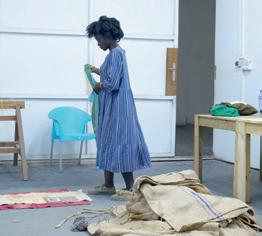

Q: You were one of 46 artists from around the world invited to the Biennale. Can you tell us about RE/MIX, the exhibition you put on?
A: This body of work explores the theme of this year’s Congo Biennale – The Breath of the Ancestors – through tales from old family photographs. Looking at the frozen objects and moments in these photos from the 1980s and 1990s, illustrates various traditional and modern events. I seek to represent how some ancient traditions submerge into the newer contemporary world to form what we now call our own culture.
Q: Can you explain a bit about the materials you used to create the pieces and any significance they might have to you?
A: I used natural cotton fabrics dyed with earth, botanical dyes and rusted metal as well as bark cloth collected from the Kagera region where my grandmothers come from. I took photo prints from my family’s archive and digitally printed them onto the fabric. I feel the materials connect the works to the people and ancestors.
Though I normally live in Dar es Salaam, I spent some months in Kagera with my family for research and the collection of these materials. Bark cloth carries a lot of significance from the ethnic group I come from, the waHaya. As an artist, it has been fascinating to look into this ancient textile.
Q: What was the process of creating these works?

After the extensive process of developing my ideas and gathering materials and inspiration, I spent about two months assembling everything together. My process is based on intuition and the connection between myself and the materials.
Q: As the only Tanzanian artist to participate in the Congo Biennale this year, what was the experience like?
Kinshasa was a wonderful place to wonder, wander and feel. It was amazing to experience other artists at work and see what goes behind the scenes of their brilliant works.
Q. What would be your advice to young creatives in Tanzania who want to become professional artists?
Seek to find your voice, because it’s somewhere waiting and when you have found it, honour it.
airtanzania.co.tz / 55
GLORY
Arts column


Our customer commitment
The word refund is rarely desirable for either passengers or airline companies, resulting in a cost to both sides. Here we guide our esteemed customers through the processes and guiding principles to follow.
Ticket refunds can be categorised into voluntary and involuntary. Voluntary are the ones that are initiated by prospective passengers while involuntary are the ones prompted by the failure of an airline to offer agreed services as per conditions of carriage. Voluntary refunds attract penalties to prospective customers in the way of cancellation penalties and service fees. In the case of involuntary refunds, prospective passengers are refunded a unutilised amount without penalties and fees. The refund penalty and service fee amounts are not fixed, they are determined by an airline from time to time.
Procedures
Refund request should be lodged by a
prospective customer or sponsor at the point where the ticket has been purchased. For those purchased online such as through an Internet Booking Engine (IBE) request should be sent to refund@airtanzania.co.tz

Upon receipt of the refund request, the point of sale changes the ticket coupon status to refunded status (R). The customer should then receive email acknowledgement that their ticket has been refunded.
Refund section will follow internal procedures for payments.
For those tickets purchased from an Iata-approved agent under a billing and settling plan (BSP) arrangement, once a refund request is made from a prospective
Supporting documents required for a refund to be considered
• Copy of Passenger ID
• Copy of Sponsor ID (in case a request is lodged by a sponsor)
• Bank details for remittances purposes
• Death Certificates in case a passenger passed away
• A refund application email request
customer or sponsor, the BSP agent shall lodge a refund application at the BSP portal and send the refund application to the Air Tanzania refund desk.
Our desk will then consider the application from BSP and if a refund is to be granted, the BSP will pay the agent and the customer will be able to collect their refund from a BSP agent.
The standard refund processing time is 15 working days. The ATCL refund desk is happy to serve you.
airtanzania.co.tz / 57
Business column
How to check your eligibility for a refund with Air Tanzania.

Sign up to Twiga Miles now and get 1,000 free points!
There’s never been a better time to take advantage of Twiga Miles, Air Tanzania’s loyalty programme, with all new members who sign up before May 19 this year getting a welcome pack of 1,000 points as soon as they take their first flight.
And that’s just the beginning of your savings as every subsequent flight you take will earn you more points, which can all be redeemed towards future free flights across Air Tanzania’s domestic and international network of destinations. The amount of points you will earn depends on your ticket type, fare class and destination.
As a Twiga Miles member each flight you take will also help you climb through the ranks of our tier system. With each tier upgrade, you’ll get access to even more varied and valuable benefits.
So, what are you waiting for? Sign up at www.airtanzania.co.tz now.
FAQS
How do I enrol?
Visit airtanzania.co.tz or contact our call centre on 0800 110 045

Will I get a membership card?
Cards will be issued to Silver Selous and Gold Serengeti members.
How long does it take for my points to be transferred to my account? Your points will have been transferred
Member Benefits
BLUE
SILVER SELOUS
GOLD SERENGETI
Start earning points towards a free flight with Air Tanzania.
Members will earn 25% more points than Blue members on each flight they take.
Free extra 5kg baggage allowance on domestic flights
Priority check-in at Dar, Kilimanjaro and Zanzibar airports
Priority membership baggage tags that ensure your bags are first on conveyor belt at your destination
Members will earn 50% more points than Blue members on each flight they take.
Free extra 10kg baggage allowance on domestic flights

Priority check-in at Dar, Kilimanjaro and Zanzibar airports
Priority membership baggage tags that ensure your bags are first on conveyor belt at your destination



to your account no later than 72 hours following your flight.
How long do my points remain valid?
Until the end of the third calendar year following the date you earned them. For example, points earned in June 2021 remain valid till the end of 2024.

How can I spend my points? You can spend your points by clicking
on “Use My Points to Buy” section under the payment options tab for the tickets you are going to buy on our website at www.airtanzania.co.tz
Twiga Miles is only for passengers aged 18 and above. The scheme applies to all Air Tanzania destinations. Air Tanzania reserves the right to amend the terms and conditions of the campaign. All users participating in the campaign are deemed to have read and accepted these rules.
airtanzania.co.tz / 59
Before take-off
Taking your first flight is certainly exciting, but can also become a source of stress for those who are unfamiliar with the rules, procedures and customs of flying. To prepare yourself for your first flight, it is therefore important to get information on everything you need to do before and during your journey. Here is a useful pre-departure checklist.
1 Before departing, it is important to check the airline’s website for its hand luggage rules: weight, sizes and types of objects you can take on board. For example, as regards liquids, you are advised to carry these in your hand luggage, only in transparent, reseal able, plastic containers, not exceeding 100 ml. In this section, you will find information regarding the hand luggage permitted on your flights; if you have connection flights, we advise that you also check the websites of other airlines.
2 Arriving at the airport in advance (at least two hours for domestic flights and three hours for international flights)
will enable you to check in and board your flight calmly, without anxiety and without unexpected last-minute issues.
3 Check in online, if possible. If travelling with hand luggage alone, you can check in online and print or download your boarding pass which you must take with you directly to security checks. This will enable you to save precious time once at the airport and to go to the gate calmly. For further information, please visit the dedicated page.
4 Set your mobile to flight mode, as well as other devices connected to the internet that you are taking on board.
AIR TANZANIA FLEET

Cabin crew will remind you of this step before take-off. With flight mode set, you can still take photos of your unforgettable journey and you can also enjoy the in-flight entertainment system! To find out more, please visit the dedicated section.
5 If you suffer from motion sickness… you will only find out about it during your first flight! To prevent sickness from ruining your first flight on a plane, we advise you to take natural remedies, such as, for example, ginger tablets or gum to chew. Ginger is believed to have a anti-nausea properties. Otherwise, ask your doctor to prescribe you antihistamines with a sedative effect.
6 Enjoy the view! By choosing a seat near the window, you will see breath-taking landscapes and you can take photos of the exquisite white clouds you will be flying above.
7 Try to take a nap. Sleeping on the plane will make time pass faster and you will arrive at your destination calm and rested.
8 Lastly, especially during take-off and landing, the change in pressure inside the cabin may cause discomfort in your ears. To prevent this discomfort, you are advised to stay awake during these manoeuvres and to chew gum or wear earplugs.
National carrier Air Tanzania is justifiably proud of its revamped six-strong fleet. Here we take a close-up look at our aircraft with technical data and specifications.
DE HAVILLAND CANADA DASH 8-Q400
Number of aircraft available: 5 De Havilland Canada
Seat capacity: (3 De Havilland Canada) Business Class 6, Economy 70, (1 De Havilland Canada)
Business class 10, Economy 68
Number of flight-deck crew: 2 Range: 2,063 km (1,362 Nm)
Typical cruising speed: up to 360 knots (414 mph or 667 km/hr)
Wingspan: 93 ft 3 in (28.4 m)
Length: 107 ft 9 in (32.8 m)
AIRBUS 220-300 (CS300)


Number of aircraft available: 4
Seat capacity: Business Class 12 and 120 Economy Class
Number of flight-deck crew: 2 Range: 6,112 km (3,300 Nm)
Typical cruising speed: 470 knots (541 mph or 871 km/hr)
Thrust per engine at sea level: 23,300 lbf / 103.6 kN
Wingspan: 115 ft 1 in (35.1 m)
Length: 127 ft (38.7 m)
Interior cabin width: 129 inches (3.28 m)
BOEING 787-8 DREAMLINER
Number of aircraft available: 2
Seat capacity: Business Class 22 and 240 Economy Class
Number of flight-deck crew: 2 Range: 13,621 km (7,355 Nm)
Typical cruising speed: 488 knots (561 mph or 903 km/hr)
Thrust per engine at sea level: 64,000 lbf / 280 kN
Wingspan: 197 ft 3 in (60.12 m)

Length: 186 ft 1 in (56.72 m)
Interior cabin width: 18 ft 0 inch (5.49 m)
60 / Twiga
Travel information
Passports and visas
A valid passport or travel document that is valid for at least six months is required to enter the United Republic of Tanzania.
Visitors will also require a valid visa upon arrival. There are a range of visas available depending on the nature and frequency of your visits, but a single entry visa can be obtained on arrival in Tanzania subject to the fulfilment of all immigration requirements. There is a US$ 50 charge for the visa.
For a full list of visas available and for countries for which special terms exist, visit the Air Tanzania website.
Check-in
Check in online, if possible. If travelling with hand luggage alone, you can check in online and print or download your boarding pass, which you must take with you directly to security checks. You should check in two
hours ahead of your flight time for domestic flights and three hours for international flights.
Family travel
Fares for infants and children
As a general rule, children up to two years old are not required to have their own seat and are allowed to travel on parents’ lap. An infant tickets costs 10 per cent of the regular fare. Depending on the destination, taxes and fees may apply. Please note that only 1 baby per adult is accepted. You can choose to buy a seat for your baby at the reduced rates for children if any children’s rate is applicable.
If your child is older than two years or turns two while you are travelling, you will have to book a separate seat for him or her and book the children fare for the entire journey. If a child travels with an accompanying adult in the same class of cabin, the child should be seated in the same seat row as the accompanying adult. Where this is not possible, the child should be seated no more than one seat row or aisle away. Reduced rates apply for children aged two to 11 on most routes, depending on the travel class. Children turning 12 years en route need to be booked as adults for the entire journey.
Expectant mothers
Our priority is always your safety and that of your unborn child.
To avoid unnecessary risks to you and your baby, we recommend
that all expectant mothers consult a doctor before booking their ticket and inquire about their fitness to fly the length of the trip they intend to take.
Depending on the stage and circumstances of your pregnancy, you may be required to present certain medical forms before flying. For your own safety and the well-being of your child, Air Tanzania will not accept expectant mothers who are pregnant from their 34th week or beyond.

UMNR (children travelling alone) If you’re planning for your child to travel alone, we’re here to make sure they enjoy their trip and that they are well taken care of throughout their journey.
When you book our unaccompanied minor service, your child will be received at the originating airport, taken care of during transit and while on board the aircraft. He or she will be handed over to the person designated by the parents/ guardians upon arrival at the final destination.
Cost
To avail the unaccompanied minor service, an adult fare needs to be purchased for the child. Please contact us to book the flight and the service.
Infant fare checked baggage allowance
Infants travelling on an infant fare are allowed 10 kg as baggage allowance.
Child fare baggage allowance
Children and infants travelling on a child fare are eligible for the same baggage allowance as adults.
Wheelchairs
If you need wheelchair assistance at the airport, you must advise Air Tanzania of this at the time of booking. You can request wheelchair assistance through our Call Centre or at Air Tanzania Sales offices.
Inflight Wi-Fi
On board Wi-Fi Enable Wi-Fi on your laptop, tablet or smartphone, and select AirTanzaniaWifi

You will need to launch your web browser, which will display the log-in web portal. From the portal, simply select your preferred price plan.
Portable electronic devices (PEDs) You can use your e-readers, tablets and smartphones from gate to gate – including taxiing, take-off and landing – without a risk to safety.
Note that on-board Wi-Fi is only available on certain aircraft. Please follow cabin crew instructions at all times.
airtanzania.co.tz / 61
BAGGAGE ALLOWANCE
FREE
has a free allowance for passengers’ baggage across economy and business class. For full details and rates please
or contact booking enquiries
Booking
Enquiries:
Flying between Free allowance Free allowance COMOROS -
30 kg 40 kg TANZANIA -
23 kg 30 kg AFRICA - INDIA 2PC @ 23 kg 3PC @ 23 kg AFRICA - AFRICA 2PC @ 23 kg 3PC @ 23 kg BUSINESS ECONOMY
Air Tanzania
see our website www.airtanzania.co.tz
0800 110045 For
&
0800 110045 www.airtanzania.co.tz
AFRICA
TANZANIA

Dar es Salaam Zanzibar Mwanza Geita Kilimanjaro Mbeya Songea Kigoma Dodoma Bukoba Tabora Katavi Arusha Mtwara 62 / Twiga Air Tanzania destinations DISCOVER Domestic and international routes For Booking & Enquiries: 0800 110045 | www.airtanzania.co.tz


airtanzania.co.tz / 63 TANZANIA Mumbai Bujumbura Lusaka Ndola Harare Guangzhou London UGANDA Nairobi KENYA INDIA UK CHINA BURUNDI Lubumbashi DRC Kigali RWANDA ZAMBIA ZIMBABWE Dar es Salaam Dubai UAE Muscat OMAN Dzaoudzi MAYOTTE Goma DRC Johannesburg SOUTH AFRICA Juba SOUTHERN SUDAN Kinshasa DRC Lilon ilon MALAWI Entebbe Entebb Lagos NIGERIA Comoros ilongwe International customers call: +255 222 113 248 Active routes Upcoming routes
WHERE TO CONTACT US
CONTACT CENTRE
Location: ATC House, Ohio Street. Email: contactcentre@airtanzania.co.tz
0800 110045 Toll Free (Tanzania only) Tel: +255 22 2117500 International customers: +255 222 113 248
AIR TANZANIA CONTACTS

DAR ES SALAAM (HQ)
Location: ATC House, Ohio Street PO Box 543 Office (JNIA) Tel: +255 222 117 500 Email: darairport.station@airtanzania.co.tz
ARUSHA
Location: Old Moshi Road, NSSF Mafao House Email: arusha.station@airtanzania.co.tz Tel: + 255 272 520 177/ +255 739 787 500
MBEYA
Location: Mbeya Mjini Email: godfrey.Samanyi@airtanzania.co.tz Mob: 0714 800 080 / 0737 800 090
COMOROS
Location: Immeuble MATELEC Moroni, Grande Comores Email: com’airgsaatc@gmail.com Tel: +269 3312570 / +269 3322058
BUKOBA
Location: Jamhuri Road, NSSF Building Email: airtanzaniasalesbukoba@gmail.com Tel: 0767351336 /0735351336
KILIMANJARO
Location: KIA Email: arusha.station@airtanzania.co.tz Mob: +255 735 787 249
DODOMA
Location: Hatibu Road, Tofiki Street, CDTF Building Tel: + 255 262 322 272/ 0735 787 241 (mobile)/ 0683 776 744 (mobile) Email: dodoma.station@airtanzania.co.tz
MWANZA
Tel: +255 735 787 239/ +255 28 2501059 Email: mwanza.station@airtanzania.co.tz
E-COMMERCE
Location: ATC House, Ohio Street. Email: tce-commerce@airtanzania.co.tz
For the latest flights, information and to book online, visit: www.airtanzania.co.tz

Follow us on: @AirTanzania @airtanzania airtanzania_atcl Air Tanzania ATCL
TABORA
Email: tabora.station@airtanzania.co.tz
SONGEA
Location: African Benedict Office Hanga- opposite TRA Songea Email: songea.station@airtanzania.co.tz Mob: +255 712 796 421
KIGOMA
Location: Lumumba Road, opp. Mambo Leo Pharmacy Email: kigoma.station@airtanzania.co.tz Mob: +255 742 580 580
IRINGA
Location: Asas House, Dodoma Road, opp. TCC. Email: Iringa.station@airtanzania.co.tz Mob: +255 753 574 986
ZANZIBAR
Location: Postal Building, Kijangwani Email: zanzibar.station@airtanzania.co.tz Mob: +255 785 452 585
ZIMBABWE
Location: 24 Shamwari Complex, 157 Sam Nujoma Street, Ext Belgravia, Harare Email: hresalestc@airtanzania.co.tz Tel: +263 424 796 286/7 Mob: +263 773 119 462
ZAMBIA
Barnetts Building, Shop 3, Hailie Selasie Avenue, Longacres, Lusaka. Mob: +260 956 610 250 Email: support.lusaka@airtanzania.co.tz
KAMPALA
Location: Park Royal Mall, Room 208, Buganda Road. Email: uganda.station@airtanzania.co.tz Email: bbesalestc@airtanzania.co.tz Tel: +256 414 289 474 / +256 393 517 145
ENTEBBE
Location: Entebbe International Airport, Room no 095. Email: uganda.station@airtanzania.co.tz Email: bbesalestc@airtanzania.co.tz Tel: +256 716 680 250
BURUNDI
Location: Bujumbura-Mairie, Boulevard de la Liberté, Galerie Alexander, No 10 Email: fantasticvoyage1@gmail.com Tel: +257 610 139 48.
INDIA
Location: Ajanta Travels PVT Ltd, VN Road, Mumbai.
Email: Res.bom@airtanzania.co.in Tel: +91 224 979 0108/09/ +91 98200 61232 (cargo)/ +91 98193 65286 (reservations)/ +91 740 0084680 (staff airport supervisors)
JOHANNESBURG
Location: West Tower, 2nd Floor, Nelson Mandela Square, Maude Street, Sandown, Gauteng, South Africa 2146 Email: southernafrica@airlinepros.com Tel: +27 11 881 5945 Tel: +27 11 881 5945
NAIROBI
Location: 35 Muthithi Road, Stellato Building, Westlands, Nairobi, Kenya Mob: +254 736 197 197 / +254 732 247 000.
64 / Twiga Air Tanzania contacts








































































































































































